EUROF RUIT






Blue Whale’s Christelle Bertin explains why a connection with the next generation is vital for the future of the produce industry


Not only do quality standards continue to rise in the face of various challenges that engulf the Mediterranean region, they have crucially become increasingly uniform
The Mediterranean may not be famous for its waves, but the region has experienced more than its fair share of rough seas in recent years: from the refugee crisis emanating out of lawless Libya, to floods and forest fires across Greece and Turkey; from the devastating explosion at Beirut port in Lebanon, to the Israeli bombardment of Gaza and subsequent disruptions across Suez in the Red Sea. And yet, in the fresh fruit and vegetable business, what we tend to see is that produce continues to make its way from this diverse region to markets across the globe – albeit with a detour around South Africa sometimes thrown in to the mix. Not only do quality standards continue to rise in the face of these challenges, they have crucially become increasingly uniform. This benefits everyone down the supply chain, not least the final consumer. Against all odds, date producers in the West Bank continue to seek out new markets, including in North America, while Lebanese grape exporters see potential for overseas sales of multiple other fruits, and Egypt looks set to become the next big hope in blueberry production. In Morocco, the new SweetCott promises a revolution in the mandarin category. And, as our cover feature shows, regeneration is the buzzword in France, where a Blue Whale-led consortium looks to ensure the agroecological transition of the apple sector. E

Tom Joyce, News Editor

Christelle
of French exporter
Blue Whale says the next generation is vital to boost consumption and
LOGISTICS & SERVICES
BIOSOLUTIONS
BUSINESS & KNOWLEDGE
PRODUCTION & TRADE

NURSERY & SEEDS
MACHINERY & PLANTS
PACKAGING
AGRICULTURAL MACHINERY
SPICES & HERBS
GREENHOUSES & IRRIGATION
8-9-10 MAY 2024 RIMINI-EXPO
IN COLLABORATION WITH:

macfrut. com



Fruitnet
Sales
fruitnet.com/berrycongress
The Global Berry Congress brought together leading players in the fresh berry category to connect and share in-depth experience and expertise, whilst exploring new ideas.
instagram.com/fruitnet
Follow Fruitnet's Instagram page for regular photos and updates from the Fruitnet team.

fruitnet.com/eurofruit eurofruit's news website provides regular updates on all the top stories from the European fresh fruit and vegetable business. News


https://desktop.eurofruitmagazine.com
Download the new Eurofruit app onto your smartphone or tablet from the App Store or Google Play. Stay informed of the latest fresh produce industry developments, and enjoy our magazines in new user-friendly digital formats.
linkedin.com/showcase/eurofruitmagazine
Expand your network of professional contacts and join the fresh produce conversation by visiting the eurofruit LinkedIn account. LinkedIn

x.com/eurofruit
Keep up to date with news, opinions and developments from around the European fresh produce trade by following our dedicated X account.
fruitnet.com/freenewsletter
Fruitnet Daily News is the fresh produce industry's leading source of news, information and insight. Available free to all, it is essential reading for those who need to keep track of developments and trends in the international fruit and vegetable business.
https://anchor.fm/fruitbox
Listen to Fruitnet's podcast series hosted by managing director Chris White in London. The Fruitbox podcast features conversations and interviews with leading industry experts. Fruitbox

SINCE 1973
EDITORIAL
managing director, fruitnet europe
Mike Knowles
+44 20 7501 3702 michael@fruitnet.com
managing editor
Maura Maxwell
+44 20 7501 3706 maura@fruitnet.com
deputy editor
Carl Collen
+44 20 7501 3703 carl@fruitnet.com
news editor
Tom Joyce
+44 20 7501 3704 tom@fruitnet.com
staff writer
Fred Searle
+44 20 7501 0301 fred@fruitnet.com
design manager
Simon Spreckley
+44 20 7501 3713 simon@fruitnet.com
senior designer
Qiong Wu
+61 3 9040 1603 wobo@fruitnet.com
senior graphic designer
Mai Luong
+44 20 7501 3713 mai@fruitnet.com
graphic designer
Asma Kapoor
+44 20 7501 3713 asma@fruitnet.com
EVENTS & MARKETING
head of events and marketing
Laura Martín Nuñez
+44 20 7501 3720 laura@fruitnet.com
events executive
Poppy Bowe
+44 20 7501 3719 poppy@fruitnet.com
MANAGEMENT
commercial director
Ulrike Niggemann
+49 211 99 10 425 ulrike@fruitnet.com
managing director
Chris White
+44 20 7501 3710 chris@fruitnet.com
sales director
Artur Wiselka
+44 20 7501 0309 artur@fruitnet.com
senior sales manager
Giorgio Mancino +44 20 7501 3716 giorgio@fruitnet.com
account manager
Josselyn Pozo Lascano +44 20 7501 0313 josselyn@fruitnet.com
us & canada
Jeff Long +1 805 448 8027 jeff@fruitnet.com
italy
Giordano Giardi +39 059 786 3839 giordano@fruitnet.com
germany, austria, switzerland, middle east
Heike Hagenguth +20 100 544 5066 heike@fruitnet.com
morocco, france, tunisia Cristina Delof +34 93 000 57 54 cristina@fruitnet.com
south africa Fred Meintjes +27 28 754 1418 fredmeintjes@fruitnet.com
asia pacific
Kate Riches +61 3 9040 1601 kate@fruitnet.com
finance director
Elvan Gul +44 20 7501 3711 elvan@fruitnet.com
accounts receivable
Tracey Haines +44 20 7501 3717 tracey@fruitnet.com
finance manager
Günal Yildiz +44 20 7501 3714 gunal@fruitnet.com
subscriptions +44 20 7501 0311 subscriptions@fruitnet.com

Anton Filippo lbp rotterdam
Anton outlines that LBP Rotterdam continues to seek out new opportunities, seeing great potential in areas such as Turkey and Colombia. mediterranean–p32-33

Fred Meintjes eurofruit
Fred speaks with the leaders of Dutoit Group in South Africa, as the Ceres-based fresh produce grower and marketer celebrates 130 years in the business.
south africa–p50-53
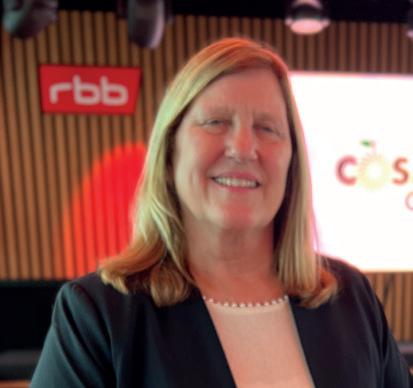
Kathryn Grandy pvm
Kathryn says that global stardom awaits for Cosmic Crisp as the brand looks set to continue its stratospheric rise in Europe.
apples–p42

Adam Olins berryworld
Adam confirms that even in large, developed markets like Germany and France, there are still big opportunities to sell more fresh berries.
berries–p60


The fresh produce industry is expected to mount a legal challenge against PPWR, the EU’s new packaging directive, which singles out plastic used for fruit and vegetables but leaves other food categories unaffected
by Mike Knowles
@mikefruitnet
The European Parliament and Council have reached a provisional agreement on revamped rules to reduce, reuse and recycle packaging.
According to the European Commission, the new measures – known as the Packaging and Packaging Waste Regulation (PPWR) – will increase food safety and boost the circular economy.
They aim to make packaging used in the EU safer and more sustainable, by requiring all packaging to be

recyclable, minimising the presence of harmful substances, reducing unnecessary packaging, boosting the uptake of recycled content and improving collection and recycling. However, revisions to their original proposal have swapped an initial ban on all single-use packaging for fruit and vegetables with a more focused ban on plastic packaging only.
“We call on all sectors, EU countries and consumers to play their part in the fight against excess packaging”
As Fruitnet reported back in February, industry leaders say the rules will do enormous damage and unfairly singled out the fruit and vegetable industry. They also argue it will increase food waste, restrict consumer access to healthy food,
and have little material impact on overall rates of recycling.
Philippe Binard, general delegate of industry association Freshfel Europe, told Fruitnet the ban was poorly conceived, discriminatory, and probably illegal.
“We don’t see a reason to ban packaging for fruits and vegetables, specifically not plastic packaging for fruits and vegetables,” he said. “There is no impact assessment. If [Parliament and Council] come to an agreement, there will be legal cases challenging that proposal for sure.”
The agreement, which the Parliament and Council need to approve formally before it can enter into force, sets packaging reduction targets of 5 per cent by 2030, 10 per cent by 2035, and 15 per cent by 2040. It also requires EU countries to reduce, in particular, the amount of plastic packaging waste.

According to the deal, a number of different single-use plastic packaging formats, including packaging for unprocessed fresh fruit and vegetables, would be banned from 1 January 2030.
The negotiators agreed that all packaging should be recyclable, fulfilling strict criteria to be defined through secondary legislation.
Certain exemptions are foreseen for lightweight wood, cork, textile, rubber, ceramic, porcelain or wax.
Other agreed measures include minimum recycled content targets for any plastic part of packaging; and minimum recycling targets by weight of packaging waste generated and increased recyclability requirements.
Rapporteur Frédérique Ries, commented: “For the first time in an environmental law, the EU is setting targets to reduce packaging consumption, regardless of the material used. We call on all
industrial sectors, EU countries and consumers to play their part in the fight against excess packaging.”
The response from within the fresh produce business and the packaging sector has been extremely critical. Martin Engelmann, director general of the German Plastic Packaging Association, IK, believes the whole proposal has been drawn up without proper scientific research.
“The Commission failed to assess what the results, what the impact of such a ban will be,” he comments. “They just said, ‘We don’t need packaging, it’s superfluous. Consumers can take out the fruits and vegetables on their own, and put it in their own basket.’ They did not perform an impact assessment and that creates a lot of tension, because now legislators are beginning to understand that
ABOVE—Products like bagged salads and fresh-cut fruit and vegetables might require packaging alternatives OPPOSITE—MEP Frédérique Ries led the Parliament’s drafting of the PPWR proposal
packaging actually has a role to play in protecting fruits and vegetables.”
According to Binard, fruit and veg accounts for only around 1.5 per cent of all food packaging in the EU, while about 50 per cent of all fresh produce in the market is sold loose. This, he says, means the ban will have a very small effect overall.
Massimiliano Del Core, president of Italian interprofessional organisation Ortofrutta Italia, says the entire fresh produce industry in Italy is extremely unhappy about the way PPWR has evolved.
“This is not just because of all the business implications, but also because of the shelf-life of the product, and the fact we need to export our product in 7-10 days from the moment of harvesting,” he explains. “We also have to bring value to the consumer by communicating, promoting, and informating them about the product.” E
Unica Fresh and Koppert take the top prizes at this year’s expanded Fruit Logistica Innovation Awards on the final day of the Berlin trade show.
by Carl Collen @carlfruitnet

Zucchiolo, the new vegetable product from Unica Fresh in Spain, has won this year’s Fruit Logistica Innovation Award.
Announced at a special awards ceremony on the final day of Fruit Logistica in Berlin, Zucchiolo was voted by trade show visitors as the most innovative new fresh product in the business.
Consumed fresh or raw in a salad like a cucumber, Zucchiolo can also be cooked like a zucchini or an aubergine. In addition, 50 per cent of the income generated from its sales are allocated to social purposes, including the fight against cancer and degenerative diseases.
“The Innovation Awards at Fruit Logistica are truly an honour,” said Andrea Álvarez, business
development manager at Unica Fresh. “It’s a motivating push for all professionals in the industry to wake up every morning and pursue what we love most: adding value to our farmers’ crops.
“Developing new vegetables is challenging, but our goal is always to introduce nutritious and healthy products to society,” she commented. “I thank the entire Zucchiolo value chain, from the geneticists to the marketing team to the farmers for their trust. Everyone pushed for this product to come on the market.”
Other nominees in the category included Three Halves Avocado Fresh from Infuseo, Frutastic by Gautier Semences, Exceed Watermelon from Staay Food Group and Calypso Sweet Red Onions by Bedfordshire Growers.
LEFT—Unica Fresh added its name to the list of winners BELOW—Koppert took home the first FLIA Technology prize
“Developing new vegetables is challenging, but our goal is always to introduce nutritious and healthy products to society”
The first ever Fruit Logistica Innovation Award Technology, a new prize highlighting the technological developments across the business, was won by Koppert’s Mirical release system.
Koppert said that significant improvements had been made to Mirical, its biological control solution for destructive whitefly in greenhouse vegetables. As a result, the predatory bug Macrolophus pygmaeus was stronger and be er able to establish and develop itself in the crop.
“Winning the FLIA Technology is the true recognition of a year and a half hard work and shows how important biological pest control is,” explained Tim Bossinga, product manager biologicals at Koppert.
“We are excited that our evolution with something simple such as cardboard strips gained the award.
“With our new packaging the predatory bugs are directly placed in the plants,” he outlined. “Our innovation speeds up the introduction of the animals and is labour saving. We are very happy that Fruit Logistica gave us this great stage for our product.”
Also in the running for FLIA Technology were Aspara To Go by Hepro, Crop Load Vision from Croptracker, Roto-Cut Vegetable Trimmer by Wyma Solutions and Apogee from German Bionic. E

Newly inaugurated Almeria-based global breeding innovation centre plays a “critical role” in bringing vegetable seeds to growers.
by Carl Collen @carlfruitnet
Syngenta Vegetable Seeds has inaugurated what it has called a modernised and expanded R&D facility in Almería, Spain.
Located in El Ejido, the global breeding innovation centre played a ”critical role” in helping Syngenta bring quality vegetable seeds to growers in Spain and beyond, it said. Key vegetable crops bred at the facility included tomatoes, peppers, cucumbers, squash, and melon.
“Every investment we make is focused on one key principle – how can we be er serve growers,” said Ma hew Johnston, global head of vegetable seeds and flowers at Syngenta. “This expanded and modernised facility in El Ejido highlights the importance of Spain in the global agricultural landscape while underscoring our commitment to accelerating our innovation to help growers who are dealing with volatile climates and challenging environments to grow produce and feed the world.”
Syngenta’s El Ejido site was first established in 1983 and is now home to 145 employees working across R&D, production, commercial and corporate functions.
The group explained that the most recent investment of US$3m covered a series of enhancements to the site that centralises seed activities in Europe, allowing Syngenta to be er respond to the needs of growers. Investments included upgraded greenhouses

to enable year-round breeding activities, redesigned pathology and quality labs, a seed processing area, and deployment of digital tools.
In addition to El Ejido, Syngenta has also invested in expanding breeding operations across other areas of Spain. This included a new trialling location in La Puebla, Murcia, with a dedicated focus on leafy and brassica crops.
“Our investment in Spain is a great example of how our global R&D footprint is intentionally shaped around localised breeding programmes, giving us the ability to respond faster to the needs of growers in every region,” said Uri Krieger, global head of R&D for Syngenta Vegetable Seeds and Flowers.
“Our ability to innovate faster is made possible through enabling technologies in the field and in the lab,” he added. “Capturing data at every step of the R&D process allows us to be precise and effective in our decision processes.” E


ABOVE—The modernised and expanded facility has seen US$3m of investment in upgraded greenhouses, a seed processing area and digital tools
One of the pioneers of Spanish agriculture, Muñoz took Murcian produce to the world.
by Maura Maxwell @maurafruitnet
Antonio Muñoz Armero, the founder of the AMC Group holding company, has died at the age of 93. Muñoz was a towering presence in Spanish agriculture, turning the company he inherited from his father into
Today, Muñoz’s son, Álvaro Muñoz Beraza leads AM Fresh, the fresh fruit branch of the group and his brother Antonio oversees AMC Natural Drinks. The third brother, Carlos, is the founder and CEO of the airline Volotea.
role in positioning Spain as a global leader in fresh fruits, se ing new standards of quality and innovation that continue to shape our industry today. His tireless dedication, coupled with his infectious enthusiasm for surprising the world with the exceptional, has inspired us all to reach new heights of achievement.

a holding group made up of more than 70 companies with annual sales of €1.3bn.
AMC Group was created in 1931 by Antonio Muñoz Muñoz, trading paprika and later lemons. But it was Muñoz Armero that oversaw its global expansion, forging into new markets from Russia to the US and Asia. Until recently, he still visited the company’s offices in Espinardo daily to keep abreast of its progress.
AM Fresh said: ”Antonio Muñoz Armero’s journey was not just one of remarkable achievements; it was a testament to the power of passion, dedication, and unwavering commitment. As the second generation and indubitable contributor to the growth of our company, his unique personality and passion for excellence have le an indelible mark on all of us.
”Throughout his illustrious career, Antonio played a pivotal
”Antonio was a constant presence within our community, his work ethic, dedication, and accessibility guiding us all. His love for our company and his boundless generosity of spirit will forever remain at the heart of AM Fresh Group. For our CEO, his family, and many members of the AM Fresh community, our honorary president Antonio has been a constant inspiration, guiding us in all aspects of life– as a father, an entrepreneur, a husband, and a person.”
The president of the Region of Murcia, Fernando López Miras, described Muñoz as “a business leader who has taken the name of the Region of Murcia to the whole world”.
In 2023, Muñoz was awarded the Regional Confederation of Business Organisations of Murcia (CROEM) Gold Medal in recognition of his professional achievements.
CROEM president José María Albarracín said the business world had lost an “authentic bastion” and “a man who had forged the history of entrepreneurship not only in the Region of Murcia, but in the whole of Spain”.
“Antonio opened Murcia to the world and broke cultural and political barriers so that his products reached inaccessible markets until that time,” Albarracín said. E
ABOVE—Antonio Muñoz Armero played a pivotal role in positioning Spain as a leading global supplier of fresh fruit

Bloom Fresh recently conducted its first-ever table grape open day in Ica, Peru. Over 80 growers and licensees attended the event, where many of the company’s table grape varietals were on display for tasting.
Peru is an essential market for the company and the table grape industry, as the country is one of the most prolific grape-producing regions in the world. It was one of the first countries in the Southern Hemisphere to switch from traditional grapes to licensed or patented varieties, which according to producer association Provid are more in demand because of their desirable attributes for consumers and because they produce higher yields.
Sweet Globe was the top exported table grape variety this season, making up 23 per cent of Peruvian exports. Overall, Bloom Fresh varieties represented over 60 per cent of the grapes shipped in the 2023/24 season.
Among the varieties Bloom Fresh showcased were Bebop, Ivory, and Candy Hearts, which the company said garnered enthusiastic comments for their overall fruit quality.
The mint-inspired Julep variety was also a favourite due to its exotic flavour with hints of eucalyptus and cinnamon, the company said.
The move follows the departure of Kenneth Avery after six months in the post.
by Maura Maxwell @maurafruitnet
Bloom Fresh has appointed Josep Jove Estiarte, its chief innovation officer, as interim CEO. It follows the departure of Kenneth Avery, who stepped down as CEO after six months.
Bloom Fresh said Avery’s dedication to the company and his goal to increase grape consumption worldwide has had a positive impact, and those goals are now at the forefront of the company’s mission.
“Under Estiarte’s leadership, the company will continue to lean into innovation, utilising natural and non-GMO new breeding practices for a healthier, tastier, and sustainable future. Additionally, Estiarte will prioritise advancing Bloom’s objective to create exceptional value for its licensed growers, marketers, and employees worldwide,” the company said.
Estiarte has been at the forefront of fruit breeding for over 20 years. He first joined the Muñoz Group in 2002 as a technologist in the table grape sector monitoring programmes for UK retailers. In 2007, he was the first employee of the SNFL Group and was later appointed managing director, helping the company to develop its breeding programmes and international business expansion.
AM Fresh Group CEO Alvaro Muñoz commented: “We are
delighted to have Josep at the helm of Bloom Fresh as he has been instrumental in understanding the growers’ challenges, identifying the market’s potential and meeting consumer’s expectations, to provide the world with some of the most popular, healthy, and delicious table grapes”.
Estiarte said: “I am very excited to continue supporting Bloom Fresh’s commitment to sustainable fruit breeding. The possibilities are limitless as we have a vast portfolio of varietals as well as a genetic powerhouse, se ing the stage for the creation of flavourful, highantioxidant, and nature-positive varieties.
“Bloom Fresh’s commitment to innovation will continue to positively impact our licensed growers, retailers, and consumers, making the industry more sustainable, innovative and consumer-oriented each day, through superior genetics and quality assurance for a be er eating experience, amongst others.
“I am grateful for all the conversations with Bloom licensees, which allows us to envision a thriving future.” E
ABOVE LEFT—Josep Jove Estiarte has been at the Muñoz group since 2002


Sainsbury’s takes the initiative on banana living wage contribution, three years ahead of the industry commitment first announced in 2023.
by Carl Collen @carlfruitnet
In February, Sainsbury’s announced that every banana bought in its stores would contribute towards paying thousands of workers a fairer wage and support the future of banana growers in Cameroon, Colombia, Dominican Republic and Ghana.
In 2023, Sainsbury’s was part of a
“Bananas are our best-selling fruit and by improving wages we can positively impact the lives of thousands of people”
group of nine UK retailers brought together by IDH that commi ed to enabling banana workers –those on large banana plantations – to receive a living wage by 2027. However, the retailer said that it had taken action to address living wages now, three years ahead of the industry commitment.
Sainsbury’s explained that the price it pays for every box of bananas now covers the cost of the fruit, plus a premium which is invested into workers’ wages. This additional money helps the workers cover food, housing, education and healthcare costs, improving their livelihoods and those of their families, it said.
The remainder of the premium goes towards helping the environment, Sainsbury’s outlined, by supporting the banana growers to implement sustainable farm practices, such as capturing carbon, reducing their water footprint and improving biodiversity and soil health.
The retailer also confirmed that it had moved to four-year contracts to give its growers “greater stability and financial security”.
Sainsbury’s said it had worked with Fairtrade and banana supplier Fyffes to make the changes possible, and called on other retailers in the UK to meet the industry commitment early “so that every banana worker across the whole industry can be paid a living wage”.
“Bananas are our best-selling fruit and by improving wages on this product we can positively impact the lives of thousands of people in the countries we source from,” said Ruth Cranston, Sainsbury’s director of corporate responsibility and sustainability. ”But we want every banana worker across the entire industry to benefit and we can’t do this alone, that’s why we’re urging other retailers to act now so that all workers can be paid fairly.
“By choosing Sainsbury’s bananas, our customers are helping to both enrich workers’ livelihoods through fairer pay and tackle climate change, supporting a thriving and enduring banana industry for the long term.
“This has all been possible thanks to our longstanding relationships with Fairtrade and Fyffes,” Cranston said. ”We look forward to many more years of working together as partnership is the key to creating resilient and responsible supply chains.” E
ABOVE—The price Sainsbury’s pays now covers the cost of the fruit plus a premium invested into wages
This is the biggest round of cuts Aldi has announced so far this year in the UK, with more than 50 items falling in price.
by Carl Collen @carlfruitnet
Aldi has announced it has lowered its prices on a range of fruit and vegetable products in the UK, including berries, grapes, tomatoes, apples and ready-to-eat salads.
In what represents the biggest round of cuts Aldi has announced so far this year, around a quarter of its produce range is included, with more than 50 items falling in price by an average of 7 per cent.
”This year we’re aiming to cut more prices than ever before –helping our customers access the lowest prices possible,” said Julie Ashfield, managing director of buying at Aldi. “At Aldi we are commi ed to making healthy and varied diets affordable for all – with many customers o en coming to us for our low prices but staying for the award-winning quality.”
Aldi noted that recent research

had found the average UK adult only ate their recommended five-a-day four times a week. To help, it has compiled a set of recipes using different fruits and vegetables available here to inspire the nation when cooking.
The retailer also recently revealed that in 2023 it spent an additional £1.3bn with British suppliers, who provide more than three-quarters of all items sold in its stores. E
https://bit.ly/FruitboxAldi
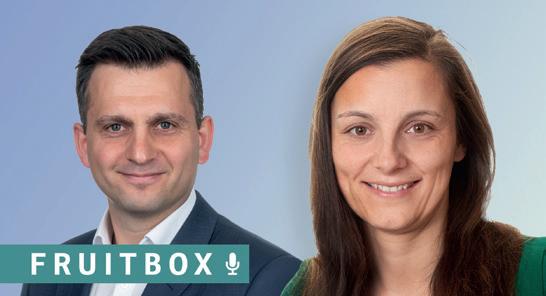

“The world’s most advanced vertical farm” has opened in Gloucestershire, growing different herbs and salad leaves.
by Carl Collen @carlfruitnet

UK-based Jones Food Company (JFC) has opened its second vertical farm, JFC2, located near Lydney in Gloucestershire. The company opened JFC1 in Lincolnshire in 2018 and a dedicated vertical farming innovation centre in Bristol in 2022.
According to the group, JFC2 utilises 100 per cent renewably sourced energy to grow crops vertically. These products include basil, coriander, flat-leaf parsley, dill, green le uce, red le uce, baby leaf pak choi, bulls blood, mizuna, komatsuna and baby leaf cress.
“This farm represents a comingof-age for agricultural technology in the UK; we have now cracked the code for accessible, sustainable, premium food being grown allyear round, at a super-competitive price,” said founder and CEO James Lloyd-Jones. “Commercial success in this sector has always been the challenge, but this farm smashes it.
“There is a place for small urban vertical farms, but size, scale and affordability are how the vertical farming revolution really

delivers,” he noted. “Technology and sustainability, when married at this kind of scale, revolutionise food production, combat climate change, ensure food security, address labour issues and maximise efficiency. It’s a win-win-win-win.
“JFC2 leverages the UK’s worldrenowned tech know-how, passion for plants and desire to reduce import dependence to radically evolve how we grow consistently high-quality, well-priced food at scale,” Lloyd-Jones continued. “By balancing automation and smart investments, we are ideally suited
LEFT—JFC2
utilises 100 per cent renewably sourced energy to grow crops vertically BELOW—Chief executive James Lloyd-Jones
“There is a place for small urban vertical farms, but size, scale and affordability are how the revolution really delivers”
to work with the distribution networks of the large retailers, ensuring product is available for all.”
JFC head of growing Glyn Stephens explained that a lot of vertical farmers had focused on lights – but temperature and humidity control were where the real “energy guzzle” had traditionally been.
“This is why it’s been a core focus for us opening this new site, it’s small changes and learnings from JFC1 that mean this system now accounts for a much smaller proportion of our energy usage,” he said.
“Irrigation is another massive innovation in this farm and the system in JFC2 is boundary-pushing, groundbreaking, u erly unique and another key brick in how we deliver premium product, at a great price, at scale.
“These aren’t small steps, they are giant leaps which allow us to put ‘vertical farming and profitability’ into the same sentence for the first time.”
The company said that JFC2’s output now included supplying own-label herbs as well as the company’s own Homegrown range of mixed salad bags and Lēaf, its range of sauces and salad bags. E



Eosta says Inverted Natural Branding makes branding more visible and increases recognisability of organic products, while continuing to avoid use of packaging.
by Tom Joyce @tomfruitnet
Dutch organics specialist Eosta has announced a new development in the world of Natural Branding: Inverted Natural Branding.
Since the introduction of Natural Branding in 2016, more and more products can carry a
logo or PLU code, with the list now including avocados, ginger, mangoes, limes, pumpkins and sweet potatoes.
According to Eosta, a recurring request from customers has been for the branding to become even more visible, improving processing

Natural
at the checkout and making clearer the product’s organic certification.
Eosta introduced double-sided branding in response, and has now developed what it calls Inverted Natural Branding, a technique whereby the company burns the logo or the code diapositively.
“We burn the surroundings, but not the logo or the text,” Eosta explained. “This way we simulate the form of a label, creating more contrast with the product's own colour. Visibility of the lasered logo thus becomes much be er and the customer can recognise the product as organic even be er.” E
The Costa Rican grower-exporter has seen strong demand on the international market this year.
by Maura Maxwell @maurafruitnet
Costa Rican mangoes fill an important window between February and May. But this year they have been in particularly strong demand due to the shortage of mangoes coming out of Peru, according to Andres Medina, managing director of grower-exporter Manga Rica.
The company’s export volume is quite evenly split between Europe and the US, with the former accounting for 55 per cent of shipments (along with smaller markets) and the la er taking around 45 per cent.
Costa Rica has more than one production cycle for mangoes, but Manga Rica is focused exclusively on the February to May window. “This is the only period where quality is guaranteed,” says Medina.
He notes that while we’re seeing a general trend towards greater mango consumption in Europe, the cost-of-living crisis has had a negative impact on growth over the past couple of years. Nevertheless, he believes ongoing quality improvements augur well for the long-term outlook for the category.
“The growing supply of pre-ripened mangoes, which undoubtedly exhibit be er appearance and fl avour, is a racting more consumers every day,” he says.
The company is now seeking to expand its varietal portfolio –which includes Tommy Atkins, Kei , Ataulfo, Irwin and, most recently, Kent – with varieties brought in from Asia. E
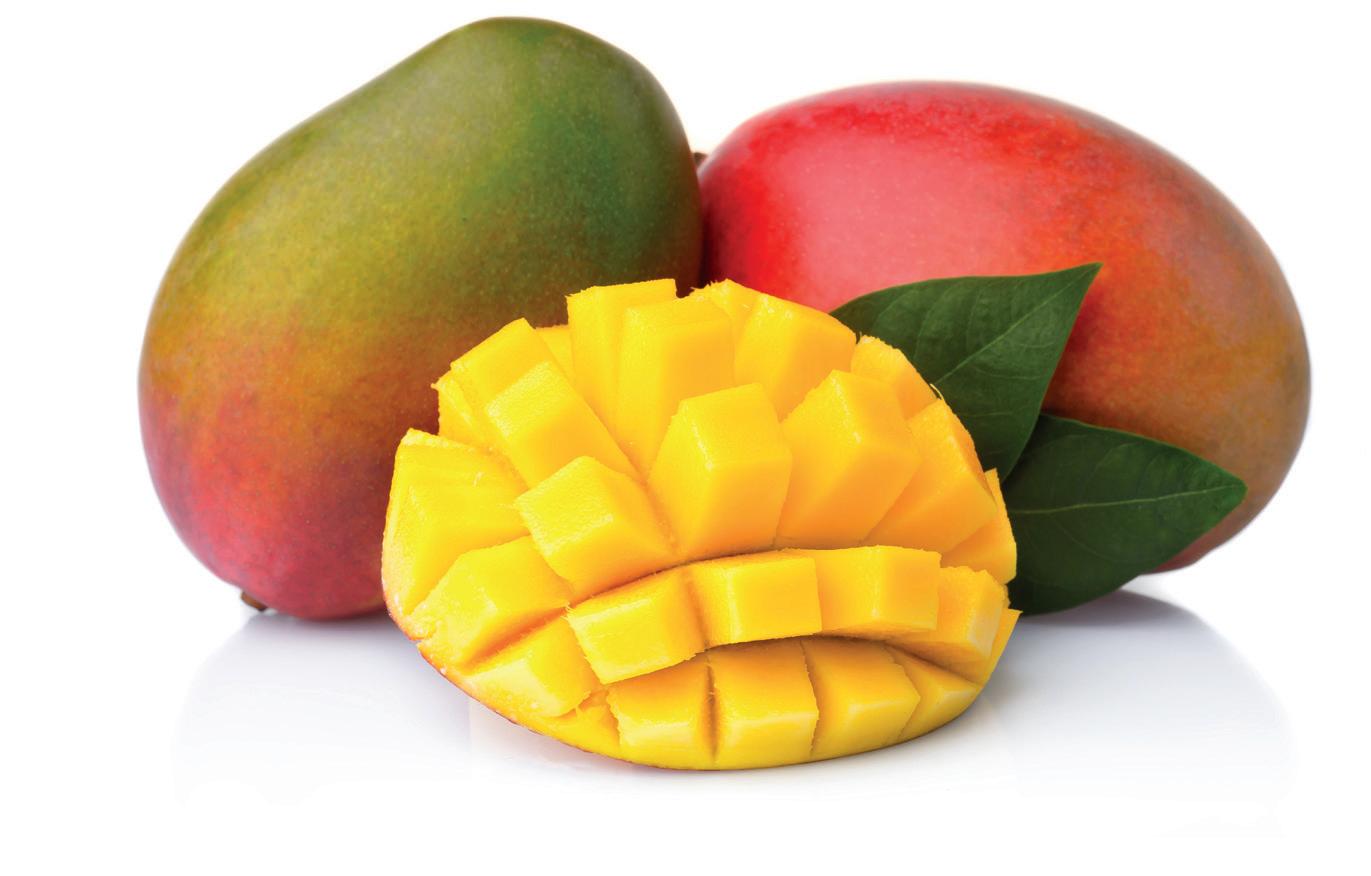

Brazil exported more than 1m tonnes of fresh fruit worth a record US$1.2bn in 2023, according to national fruit association Abrafrutas. Shipments grew 26.73 per cent in value and 6 per cent in volume compared to the previous year.
Mangoes continued to lead the export charge. Shipments increased by 51.52 per cent in value and 15 per cent in volume last year, reaching more than 266,000 tonnes.
Melons were the second most exported product in 2023, exceeding 228,000 tonnes worth US$189m. This represented growth of 20.93 per cent in value and 2.61 per cent in volume.
Avocados were amongst the fastest growing category, with exports up by 128 per cent in value and 143 per cent in volume last year. Abrafrutas said the increase reflects not only the growing popularity of avocado, but also the consolidation of this fruit as a popular choice both in terms of flavour and nutritional value.
Abrafrutas, together with the government and Brazilian export and investment promotion agency ApexBrasil, has worked hard in recent years to open new export markets for Brazilian fruit.
The association said the results reaffirmed Brazil’s position as “one of the main players in the global fruit market, standing out not only for the quantity, but for the quality and diversity of its products”.
“Abrafrutas, committed to promoting sustainable and prosperous fruit farming, celebrates this record as a significant step towards an even more fruitful future,” Coelho said. ABOVE & LEFT—Costa Rica has more than one production cycle but Manga Rica is focused exclusively on the February to May window
The company’s Costa Rican-grown pineapples are becoming increasingly popular in Europe.
by Maura Maxwell @maurafruitnet
Family-owned Jalaram Fruit is seeing strong demand for its High Colour pineapples. The premium pineapple is harvested later, allowing it to ripen for longer and giving it its distinctive sweet flavour and
limited shelf-life, but it provides the consumer with a heightened taste experience with higher brix, excellent flavour and an incredible eating experience.”
With other tropical products like mangoes suffering from supply issues, Thakrar believes pineapples are enjoying something of a renaissance due to their 52-week supply, which allows consumers to enjoy that tropical fruit experience all year round.

yellow colour. According to Suraj Thakrar, the business performed very well last year due to an increase in demand across the tropical fruit category.
“Costa Rica has fared well against other pineapple growing countries and has maintained consistent supply and quality to consumers globally,” he tells Eurofruit. “With the increased production of our farm, Finca Isha, we have been able to capture more of the European market.”
He says High Colour pineapples are becoming a fast-growing niche in the market. “We also see growth opportunities for High Colour fruit sent by sea. This is a difficult product to handle due to the
Demand for crownless pineapples also continues to grow. They are typically sold for use in the fresh-cut segment to consumer who value convenience over cost. Thakrar says a key reason for the growth of the category is that people are becoming more aware of the health benefits of pineapples, especially their high levels of vitamin C and the enzyme bromelain, which contributes towards improved gut health.
“We are also finding that consumers who don’t know how to cut a pineapple find it easier to purchase prepared, fresh-cut pineapples which also reduces food waste,” he says.
Regarding the company’s own growth, Thakrar believes a major factor is the service it offers its customers. “We are third generation growers promoting responsible practices, consistent supply and quality. This has been our value proposition for the last 14 years. Our customers have access to real time information on what’s happening on the ground in Costa Rica and benefit from our ability to be flexible and make things happen at short notice,” he explains.
For 2024, he expects volumes to be lower and prices higher than in previous years due to a combination of factors, including extreme weather pa erns and the
rising cost of agrochemicals.
“This is something that is affecting Costa Rica in particular due to the exchange rate – the Costa Rican Colón has strengthened against the dollar, pushing up dollar-related expenses,” he explains.
He is also keen to address the bad press pineapples have received recently for the environmental impact of large-scale production in Costa Rica. He insists that the situation in the country is well regulated by the government, certifying bodies and even retail customers. “In studies of various fruits and vegetables, pineapples appear at the bo om of the list when it comes to pesticide use,” he points out. “The Costa Rican pineapple industry is mature and the country is extremely responsible, with strict regulations in place to protect the environment.” E
LEFT & BELOW—Increased awareness of the health benefits of pineapples is driving sales

One of the fruit and veg industry’s top technology providers has achieved a century in business, a remarkable milestone for a group that rolled out its first ever fruit sizer all the way back in 1924.
by Mike Knowles @mikefruitnet
Fruit sorters have come a long way. In 1924, a wooden machine built in Massa Lombarda, a small commune between Ravenna and Bologna, gave growers in the surrounding area the chance to separate smaller and larger sized fruit. This made it easier for them to give the market what it wanted.
A hundred years later, the conveyor belt of innovation has delivered some remarkable and sophisticated new technologies, from near-infrared sensing to ‘see’ inside fruit, to robotic arms that can assemble a pallet of cartons in minutes.
“The average age of the Unitec team is 35 years, and the inspiration our customers give us every day are a long-life elixir”
All of that change has carried this part of the fresh produce supply chain far from its simple beginnings. That original machine was produced by a company called Dalle Vacche. Eventually, this enterprise would be transformed into Unitec, one of the world’s largest and most successful suppliers of fresh produce processing machines.
Today, Unitec offers a vast array of technology that makes it possible for growers, exporters and marketers of more than 50 different products to classify their harvests according to the size, internal quality and external appearance of individual fruits or vegetables, to pack them and carry them along complicated processing lines, and to deliver them in optimal condition to customers. And while it faces plenty of competition from other tech firms that have similarly helped suppliers to improve and guarantee their quality, Unitec’s commitment to innovation and excellence marks it out as a market leader.


“One hundred years is a timeframe that could make one feel old, but not in our case,” comments Angelo Benede i, president of Unitec. “The average age of the Unitec team is 35 years, and the inspiration and motivation that our customers around the world give us every day, by trusting us, are a long-life elixir for us.”
As it marks its one-hundredth anniversary, Benede i believes Unitec’s ability to secure real benefits for its partner customers is what sets it apart. “This is the positive energy that nourishes us, allowing us to look forward to the next hundred years,” he adds. “Thank you to every customer who trusted us over these hundred years.” E
TOP—One of Unitec’s many machines that are tailored to specific products
ABOVE—Robotics represent a key development area for the company


The event’s special online seminars are designed to provide people across the fresh produce business with expert insight and tuition in specific categories, starting with potatoes, avocados and mangoes.
by Mike Knowles @mikefruitnet

Italy’s largest fresh produce trade fair Macfrut has created Macfrut Academy, a new digital platform that it says offers a much-needed knowledge boost to the international fruit and vegetable business.
The main objective is to keep exhibitors and visitors engaged throughout the year in the run-up to what will be the 41st edition of Macfrut on 8-10 May 2024 at the Rimini Expo Centre.
The project, which kicked off a few months ago, is completely free of charge for users and can be accessed via the Macfrut website.
A er registering, video lessons on specific topics can be previewed
at a set date and time, and are then available for on-demand viewing.
The videos last about 30 minutes each and are available in four different languages – Italian, English, French and Spanish. They are hosted by different fruit and vegetable industry experts and aimed at professionals who seek to improve their overall understanding of the trade.
“The idea is to meet the demand for knowledge by se ing up a hub that will enable people to stay connected and keep up to date with the industry all year round,” says a spokesperson for the show.
“The video lessons will cover a wide range of topics, such as individual
“The idea is to meet demand for knowledge and help people keep up to date with the industry year round”
LEFT—Presenter Maicol
supply chains and emerging products, as well as production techniques and technologies. The key figures and data required to analyse the market or evaluate a technology will also be provided, with the participation of leading experts in each subject area covered.”
It is hoped the videos will stand out thanks to their hands-on approach. Each one demonstrates in practice how to solve a problem or how to use a piece of technology.
The first two lessons hosted were held in November and January, and focused on the potato supply chain and the European market for mangoes and avocados respectively.
The potatoes video discussed the supply chain, from harvesting in the fields to packaging in the warehouse, and focused on the role that new technologies can play.
For the session on mangoes and avocados, meanwhile, special emphasis was placed on the European market, and specifically wholesale markets including Ortomercato in Milan, Centro Agroalimentare in Rome, Marché International de Rungis in Paris, and Mercabarna in Barcelona.
Mango and avocado supply has increased exponentially in the last decade, and as viewers heard, demand for avocados in Italy itself has increased by 179 per cent in the last five years. E





















































































































(Re)Generation Fruit, a Blue Whale-led consortium in France, wants to support the ecological transition of the sector while providing vital economic resilience for its growers.
by Tom Joyce
@tomfruitnet
Aconsortium led by Blue Whale has launched a major project aimed at making the French apple industry more sustainable. (Re)Generation
Fruit is a five-year initiative to test and combine innovative technologies to ensure the agroecological transition of the apple sector, supported by the French government and co-funded to the tune of €8m on a global budget of €12m.
The other members of the consortium are Maf Roda, biotech start-ups Micropep and AsciepiosTech, the engineering school of Purpan and the National

Institute for Agricultural, Food and Environmental Research (INRAE).
“Our aim is to promote the ecological transition of the sector by working to maintain production levels and reduce the use of pesticides,” said Blue Whale CEO Bruno Bertheloz. “We are convinced that technological innovation will allow us to evolve towards ecologically efficient and economically sustainable production.”
Between now and 2028, the consortium is set to work on validating methods and innovations to achieve a number of goals: improving soil life, boosting plants’ natural defences against pests,
economic resilience of growers and sustainability – we think that acting concretely is the key,” Bertin highlighted. “The impact of climate change on Europe’s apple orchards, including the increasing threat of late frost, variations in rainfall, flash floods, strong winds and intense drought, should not impact the high quality of the products we provide to our clients.
“The goal with an ambitious R&D project such as (Re)

cutting the use of phytosanitary products by half, minimising fruit losses, improving the nutritional content of the fruit and producing in ways that respect the ecosystem.
The work will be carried out in experimental centres in the south-west of France and in the Loire Valley, with the partners meeting regularly to share progress. In five years, the conclusions will be communicated to the public.
(Re)Generation was launched in Montauban, France last September and unveiled internationally at Fruit Logistica in Berlin by Blue Whale’s marketing and communications manager, Christelle Bertin.
“It is very important for us to involve all links in the chain in this project,” Bertin said. “Our customers are already implementing targeted CSR plans. Through (Re)Generation Fruit, we as their producers and business partners can help them achieve their goals. That’s why continuous communication and collaboration with all stakeholders is crucial for us.”
There are two big topics in the apple category, she told Eurofruit. “The first one is, how can we revitalise consumption?” she said “And the second is, how can we create economic resilience for growers while achieving our sustainability goals?
“On the first topic – driving together the
Generation Fruit,” she said, “is to continue providing top-quality experience to consumers while using less phytosanitary products, tackling the consequences of climate change, causing less waste and providing economic resilience for growers.”
The way to do that is manifold, she added, including such R&D projects, as well as water management, the creation of the right agronomical conditions for cooling and water capture, moving to 100 per cent hail net protection and collaborating on hot climate varieties.
Another hurdle for the category in recent decades has been the difficulty in attracting younger generations to join the business. “When it comes to change management, 70 per cent of
success comes from the new generation – so new people and fresh eyes,” said Bertin. “That means you need a strategy to get new people involved, new talent. This is what we are doing when it comes to growers with the (Re) Generation programme, looking at how to ensure growers remain profitable and also have an innovative mindset when it comes to agronomy.”
On the subject of boosting lagging consumption, Bertin identifies the opportunities
“Continuous communication and collaboration with all stakeholders in the supply chain is crucial for us”
presented by the Candine apple. “If we want the new generation to go back to apples, then we have to target them with the right product in the right way, with the right communication,” she explained. “Candine, thanks to its organoleptic qualities, already shows great potential to bring younger people back to the category. It may be a good product and a good brand to do something quite different in terms of marketing. So we have the opportunity to test and learn new things about content – being bolder in the way we present it.”
According to Bertin, the main reason apple consumers give for no longer buying the fruit is disappointment. “Maybe they have been disappointed in the past –once, twice – because of the texture or the freshness,” she said.
“So it’s not just about the taste profile. It’s also about overall quality and shelf-life management, and it’s important to focus on a high-level consumption experience.” E
As the Greek strawberry season reached its halfway point, Fruitnet spoke to Alexandros Polydoropoulos, agronomist at producer Labidino, about the outlook for 2024.
by Tom Joyce @tomfruitnet
How have the weather conditions been for the 2023/24 strawberry season in Greece?
Alexandros Polydoropoulos: Cultivation started back in October with major problems, as many producers lost a large proportion of trimmed plants which could not be established in the field. Generally, the plants from different nurseries were not fully prepared for transplanting. The plants weren’t “ripe” or hardened enough for the hot and dry weather during October, so there were big plant losses, even as much as 50 per cent. Luckily, in most cases, producers were able to find plants to fill their fields. The mortality of young plants at the early stage of transplanting is worsening over the years, and some nurseries are proposing later plantings as a possible solution.
Did the season face delays as a result?
AP: In the end, the Greek strawberry season started in the first week of November as usual, with po ed plants of the Fortuna variety. This current season, Victory remains the leading variety in Greece by far, followed by Fortuna,

Arwen, Red Sayma and others. Average production fell by 15-20 per cent despite the total cultivated area in the wider region increasing by about 10 per cent compared with last season.
What other challenges are growers facing at the moment?
AP: Growers are having to deal with labour shortages, high energy costs and the constant recall of many commonly used pesticides. Prolonged good weather conditions have helped the plants that had to be replanted to gain lost ground. Unfortunately, on the other hand, pressure from pests like mites has intensified.
What are the top markets for Greek strawberries over the winter period?
AP: The markets of central and western Europe like Greek strawberries. They are generally accepted as a safe and tasty fruit, so they have gained a stable place on supermarket shelves and are enjoyed by consumers. More and more wholesalers and supermarkets are coming to Greece to make deals for strawberries. The first three months of the season have already passed without any major quality problems and

growers and traders are happy with that. These are just some of the reasons why prices have increased by up to 20 per cent compared with last year.
So things are looking more positive for the second half of the campaign?
AP: Valentine’s Day is approaching and demand is expected to increase further as people always think more about strawberries on this day. Greece is an important production region in Europe for the winter season, and the strawberry category seems to have strong growth potential in the coming years. E
Unprecedented summer heat in Morocco delayed plantings of raspberries and strawberries last year, contributing to shortages and price rises on the European market.
by Tom Joyce @tomfruitnet


E“Strawberry prices are higher than last season due to less area being planted and delays from the summer heat”
xtreme weather in Morocco has not only impacted the vegetable sector, but also the berry segment, according to Nabil Belmkaddem of Morocco’s Best Berry, causing shortages and price rises on the European market.
“There was a major heatwave in the summer in the Agadir region, which slowed the development of the summer raspberry plantings,” he said. “Therefore, we are not experiencing the usual peak of winter raspberries from Agadir.”
In mid-August, the region registered the country’s highest ever temperature of 50.4C, causing greenhouse temperatures to reach an intolerable 70C.
Plantings of both strawberries and raspberries have decreased compared to the previous season, Belmkaddem continued, the result of both the heat and other climatic factors.
“In northern Morocco, a major storm hit in lateOctober, causing a lot of damage to raspberry farms,” he revealed. “This is why we are now seeing a shortage of raspberries in the European markets and higher prices than usual. Strawberry prices are also higher than those of last season and this is due to less area being planted, as well as delayed plantings due to the summer heat.”
Early blueberry varieties from Morocco are already in production, he said, and prices are also higher than those of last season. “Year a er year, additional volumes of Moroccan blueberries are now being sold in Asia,” Belmkaddem explained. E
ABOVE—Nabil Belmkaddem of Morocco’s Best Berry LEFT—Plantings of strawberries have decreased in Morocco compared with last year
A special event taking place the day before Fruit Logistica in Berlin showcased the growth potential for Egyptian-grown blueberries.
by Carl Collen @carlfruitnet


The role that Egypt plays in producing and supplying blueberries was discussed at a special event hosted by Sekoya in Berlin. Held the day before Fruit Logistica, the meeting brought together growers, Sekoya members, marketers and retailers for presentations on the development of the blueberry business and how Egypt could grow as a supplier in future.
Hans Liekens, value chain and retail manager at Sekoya Blueberries, highlighted the growth in worldwide consumption of blueberries over the past five years, and pointed out that this was forecast to double again over the next five to seven years. The market had changed rapidly, he said, with a growing number of producers around the world, while

preferred blueberry characteristics had also evolved to, for example, larger, firmer, be er-tasting varieties. Liekens also said that the snacking market would play an important role in the growth of the segment moving forward.
Liekens outlined the problems caused by phenomena such as El Nino and other extreme weather events, and how they affected availability. With supermarkets
keen to avoid empty shelves in these scenarios, Egypt had an opportunity to be a key part of the blueberry supply chain’s ‘Plan B’, he said.
The country was a ractive as a blueberry source for a number of reasons, including its route to market via accessible shipping lanes. “The world is defined by shipping routes, and they are so important,” he confirmed. “Egypt is really well placed to take advantage of high traffic zones all over the world.”
The issue of sustainability was also an important factor when it came to shipping, Liekens said. “Supermarkets are under pressure for different reasons – price, but also CO2 emissions, sustainability, so they are buying as close to home as possible,” he commented. “For Egypt this also means really good opportunities in the Middle East as you are growing just around the corner. I think it could be really positive for the region.”
The cost of transport was also an advantage for Egypt, Liekens outlined, compared with other blueberry production regions.
“The boats from from Egypt to Ro erdam are cheaper than the trucks from Morocco to Ro erdam,” he said. “You don’t have a competitive disadvantage, being an Egyptian here. You have an advantage.”
And with Sekoya offering blueberry cultivars with a good shelf-life that tested well across tasting panels, shipping the fruit in good condition for the end consumer was not a problem.
“I believe these varieties really offer the opportunity for Egypt to operate in a competitive se ing,” he added. E
ABOVE—Hans Liekens highlighted the opportunities for Egyptian blueberries and noted the logistical advantages that the country enjoyed








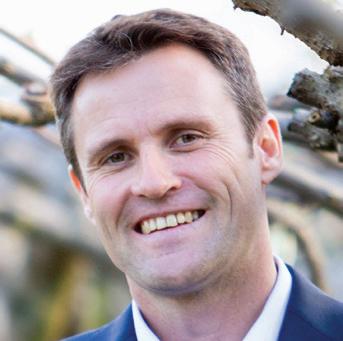


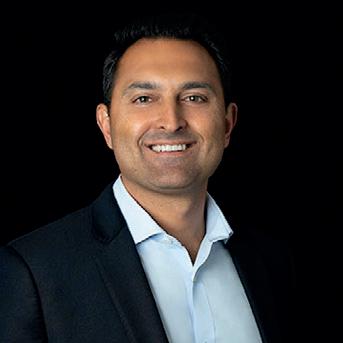







Despite the main months of the season being disrupted by the conflict, date exporters in the West Bank have continued to reach their customers, while seeking out new markets for the future.
by Tom Joyce @tomfruitnet
The ability of date producers and exporters in the West Bank to sort and ship their produce during the most important part of the season reached a new level of difficulty in October 2023.
days jericho was closed off by israel since october
“Some were reluctant to send downpayments, and all suppliers, especially input suppliers from Israel, were asking for cash in advance. So that put companies under huge cash stress.”
Despite the challenges, Nakheel Palestine and others in the West Bank have carried on shipping and looking for new business
shipments needed a lot of coordination, so there was a delay,” said Sawa a. “But none of the companies in Jericho has the capacity to absorb thousands of tonnes of dates. So everyone was looking for boxes and storage at the same time.
“By mid-November to early December, things had started to relax a li le bit, but remained very challenging. Jericho was closed for more than 100 days, so ge ing anything in and out, including labour, was very challenging. The cost of everything has also gone up, including transportation because of the issues in the Red Sea.”
Despite such challenges, Nakheel Palestine and other exporters in the West Bank have managed to carry on shipping, and continue to look for new business.
According to Mohammed Sawa a, general manager of Nakheel Palestine, date growers in Jericho are very resilient, but their capacity to withstand shocks has been pushed to the limit this season.
“October and November are the two most important months for us,” he told Eurofruit. “We harvest on 20 September and then we start sorting, grading and shipping in October. This current situation has created a lot of uncertainty, and many of our customers were not confident that supplies from Palestine could continue.
Logistical hurdles have also arisen, including following the issues in the Red Sea. “In the first three weeks of the season,
“We are a resilient farming community, and we have still been able to reach our main markets, in Turkey, Europe and the UK,” said Sawa a. “We are also looking to grow in the Nordic markets and in the US. This season was very good in terms of volumes. Unfortunately, the quality of the dates suffered due to delays to the harvesting and packing caused by the war.” E




The essential meeting for the Fruit and Vegetable sector in France
24th & 25th April 2024
Parc des Expositions - Perpignan, France
250 Exhibitors expected
5,000
Decision-making visitors expected 100% sustainable practices
30 International Top buyers
20 Top buyers from mass retail
6 Exhibition sectors
1,500 Business Meetings during the show
2 Guest Speakers during the conferences : Isabelle Autissier & Tomás García Azcárate


LBP Rotterdam continues to seek out new opportunities, seeing great potential in areas such as Turkey and Colombia while also diversifying its operations.
by Carl Collen @carlfruitnet
You have spoken about Turkey as a market that has much potential. Can you go into more detail?
Anton Filippo: We have now travelled to Turkey a couple of times with some small trade missions, and we think the potential there is enormous. With Turkey we are facing some challenges though. Turkey is very much looking at Russia still as its main export market, as well as Bulgaria, Hungary, Romania – all the countries around it. Of course, it also has a very good trade with the UK as well. Anything in between those markets such as the Netherlands is more of a challenge.
But there is so much potential for a number of products, whether that is cherries, citrus, even blueberries which are growing in a big way now. I see the potential there, I think it is going to take some time, but we need to be there now.
There are some Dutch growers investing in Turkey in fields, in glasshouses for tomatoes, and other products, so we need to be there now, trying to get ahead, like we were in Colombia 20 years ago. The people that I talk to in Turkey, they’re all interested in finding a way to use our services.
You mentioned Colombia, a country in which you have been

on the ground for some time. Does it still hold a lot of promise?
AF: In Colombia, the range of fresh products is there, the knowledge of the people is there, the quality is good and there is a plan of action, but the problem is the infrastructure. Can you get the product from the farm to the port? The roads are, often, simply not adequate. This is where the main challenge is, infrastructure.
But, much progress has been made in the country. Colombia is growing. It is number two in avocados now from South America, so it is taking huge steps.
In the US market it is doing well in avocados, it does have big competition from Mexico for avocados of course, but the US pays better prices than in Europe, for example, so it is doing very well there.
What are you hoping for in 2024, after what was a challenging 2023?
AF: Last year was tricky, yes, very difficult. We have hopes that 2024 will be much better.
A lot depends on the consequences of El Nino in countries like Peru, Ecuador and Colombia. Look at how it was last year. In a normal pre-season we would do over 100 containers of blueberries per week, and we were doing a maximum of 20 containers. There were also problems in Chile because of quality, so low volumes, and then there were floods in South Africa, so that product didn’t come in. It was a year we want to forget very quickly.
How is your customs clearing operation going?


AF: That company is going well. There are 20 people working in that company now, not only working with products from the UK or Europe, but also the likes of China and many others. This is a growing business, every day we get new enquiries, new opportunities.
In addition we have now set up a new company, Dedicated Cargo Services (DCS) that is a spin-off of the customs company. When we got
those enquiries asking ‘can you do my clearance?’, people also asked, ”can you also do my transport? Do you have some capacity to store a bit of my stuff?” So we set up DCS as a general cargo operator, rented a small warehouse, and now we can do all of that as well.
After 2023 we needed to diversify a little bit and put our eggs in more baskets. So this is a very exciting time for LBP. E
Morocco’s Les Domaines Agricoles launched the new SweetCott mandarin variety at Fruit Logistica, describing it as a revolution for the category due to its sweet, juicy taste, late availability and long shelf-life.
by Tom Joyce @tomfruitnet
The product of a decade’s research from Morocco’s Les Domaines Agricoles, the brand-new SweetCott mandarin was launched at this month’s Fruit Logistica in Berlin, marketed as the “birth of a new legend” in the category. According to marketing director Kenza Ouali, the new
14-16
average brix of sweetcott mandarin
late-producing variety is a “sweet delight”, with multiple benefits for producers, consumers and retailers alike.
“For the consumer, there is a great taste balance between a high Brix level of 14-16 and a nice acidity,” she told Eurofruit “The fruit has an amazing aroma and 20 per cent more
“The SweetCo variety is beautiful-looking thanks to a vibrant orange colour and an a ractive size and shape”
PICTURED—Kenza Ouali (le ), marketing director at Les Domaines Agricoles

juice than leading varieties. For the producer, this variety helps to extend the season by at least three weeks until the end of May.”
Retailers, she said, would cheer the fruit’s transportability and excellent shelf-life. “After picking, SweetCott can be stored for eight weeks without any alteration in the quality,” she revealed. “And the variety is beautiful-looking thanks to a vibrant orange colour and an attractive size and shape.
SweetCott is classified as a low seed variety with up to 80 per cent seedless in open field and 100 per cent seedless under cover. It really is a revolution for the category.”
Production in Morocco is set to reach commercial volumes next season, according to Ouali. “We will be selling SweetCo everywhere,” she concluded. “Our main markets are the UK, North America, the EU and the Middle East.” E
• Unique plant-based coatings for use in the organic farming of citrus fruit and FDA organic production for avocados and mangoes.
• Increase the shelf life of the fruit.
• Excellent control over chilling-injury rind damage caused during cold quarantines or prolonged refrigerated transport.
• Mitigates the appearance of aging / senescence symptoms such as the staining of the lemons blossom end.
• Excellent control over weight loss, this allows the operator to reduce overweights.
• Excellent drying. Despite being a 20% solids coating, the packing lines remain clean.
• Natural fruit shine. A shine-free coating can be achieved using the PlantSeal® Shine-Free.
• PlantSeal® Shine-Free is excellent for degreened fruit, allowing the fruit to continue its color development.
www.citrosol.com















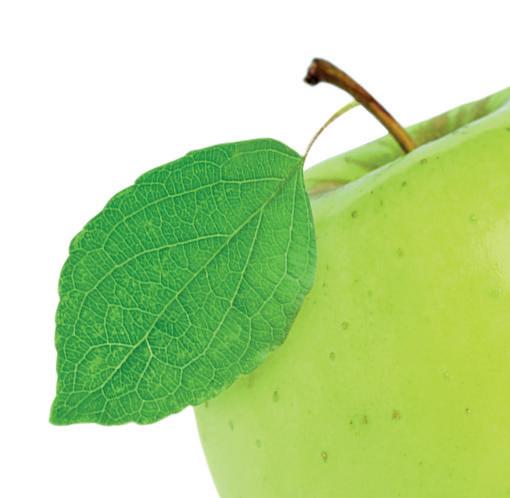





































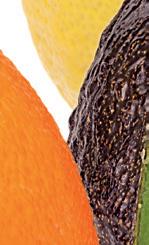














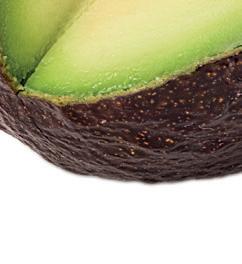













Shortages of onions worldwide have forced many countries to hold on to production for their domestic markets, with Egyptian exporters having to wait to take advantage of opportunities in Europe.
by Tom Joyce @tomfruitnet

Last year, EU wholesale onion prices increased by more than 400 per cent as global shortages, the result of a variety of factors including floods in Pakistan, droughts in North Africa and the war in Ukraine,
forced producing countries to prioritise domestic supplies.
Last August, farmers in the Indian state of Maharashtra protested against the central government’s decision to increase export duties on onions to 40 per
cent to restrict overseas sales. Domestic prices fell, while in Europe the scarcity even threatened a knockon increase in prices of other vegetables.
At this time of crisis, Egypt stood out for its stability in onion supplies, with production rising and exports flowing. According to official statistics authority Capmas, Egyptian onion exports rose by 95.9 per cent in the first half of 2023.
In October, however, even Egypt had introduced a three-month ban on onion exports, which has since been extended until 30 March.
"There is a shortage worldwide," explained Gehan Mostafa, chairman and CEO of Egyptian exporter Sadat Global, "so every country is keeping their own production for themselves. This is the first time we have faced a shortage of onions in Egypt. It is the first time exports have been stopped to cover the market."
According to Mostafa, exporters will have to wait until the government announces that exports can resume, as it did earlier this year for potatoes. "Potatoes are already there, and a lot of people are asking for them," she told Fruitnet. "This year there should be good demand for potatoes in Europe."
95.9% growth in egyptian onion exports in first half of 2023
Fears of a potato shortage won't be eased by a report from EastFruit that potato prices in Ukraine are currently four times higher than they were last year and still rising.
The most recent price increase was due to a decline in supplies from local farms in Ukraine, according to EastFruit, with a lack of long-term storage facilities forcing Ukrainian potato farmers to sell out in the first half of the season.
In Central Asia, abundant onion stocks have reportedly resulted in low prices, as companies seek to shi volumes ahead of the new harvest. E





Following multiple efforts to prevent infringement of plant breeders’ rights in Egypt, the country is now introducing grape DNA fingerprinting in time for the new campaign.
by Tom Joyce @tomfruitnet
Starting with the 2024 grape season, Egypt’s Central Administration for Plant Quarantine (CAPQ) is set to use DNA testing to identify and stop suspected illegal shipments at source.
In previous seasons, breeders and rights holders had to rely on Customs Authorities in European ports to seize and destroy illegal shipments.
Duncan Macintyre, president of The Breeders Alliance, which represents all the major table grape breeders, recently met with undersecretary Prof Saad Moussa, supervisor of Foreign Agricultural Relations and the Central Administration of Plant Quarantine and Elsayed Ahmed Abbas, technical director of Egyptian Plant Quarantine.
The Breeders Alliance has been assisting CAPQ to equip a new DNA Laboratory, and to organise staff training on the specifics of grape DNA fi ngerprinting. The Breeders Alliance is also organising the supply of the official DNA samples from all its members’ protected varieties so that CAPQ can set up its own reference database, which allow is it to rapidly verify the authenticity of export consignments. This is set
to apply to all varieties protected and registered at the Plant Protection Office at the Ministry of Agriculture and Land Reclamation.
Duncan Macintyre commented: “Egypt has proved that it is serious about stamping out IP infringements and preventing the export of unlicensed fruit. It now has both the legal framework and the technical resources to check export consignments and the penalty for infringing our members’ IP rights will be an export ban.”
Since acceding to the UPOV 91 treaty in 2019, Egypt has been implementing strong measures to fi ght Plant Breeders’ Rights infringements.
In 2021, Egypt’s Minister of Agriculture issued the Ministerial
“Egypt has proved it is serious about stamping out IP infringements and preventing exports of unlicensed fruit”
Decree No. 387, obliging farms and packhouses to be approved by the authorities and receive a code to be eligible to export grapes.
Egypt’s Central Administration for Plant Quarantine (CAPQ) then issued a decree, regulating the export process of table grapes. Under the decree, farmers or packhouses that dealt with protected varieties without a license, would risk losing the validity of their code and receiving an export ban.
“We congratulate Prof Moussa and his team at CAPQ for taking these steps,” said Macintyre. “Our members can now continue to invest with confidence in new high performance table grape varieties for the benefit of the Egyptian grape industry.” E
Having experienced rapid growth in its grape exports to markets across the globe, Lebanese producer Awdi Gardens sees potential for Lebanese cherries, plums and kiwifruit.
by Tom Joyce
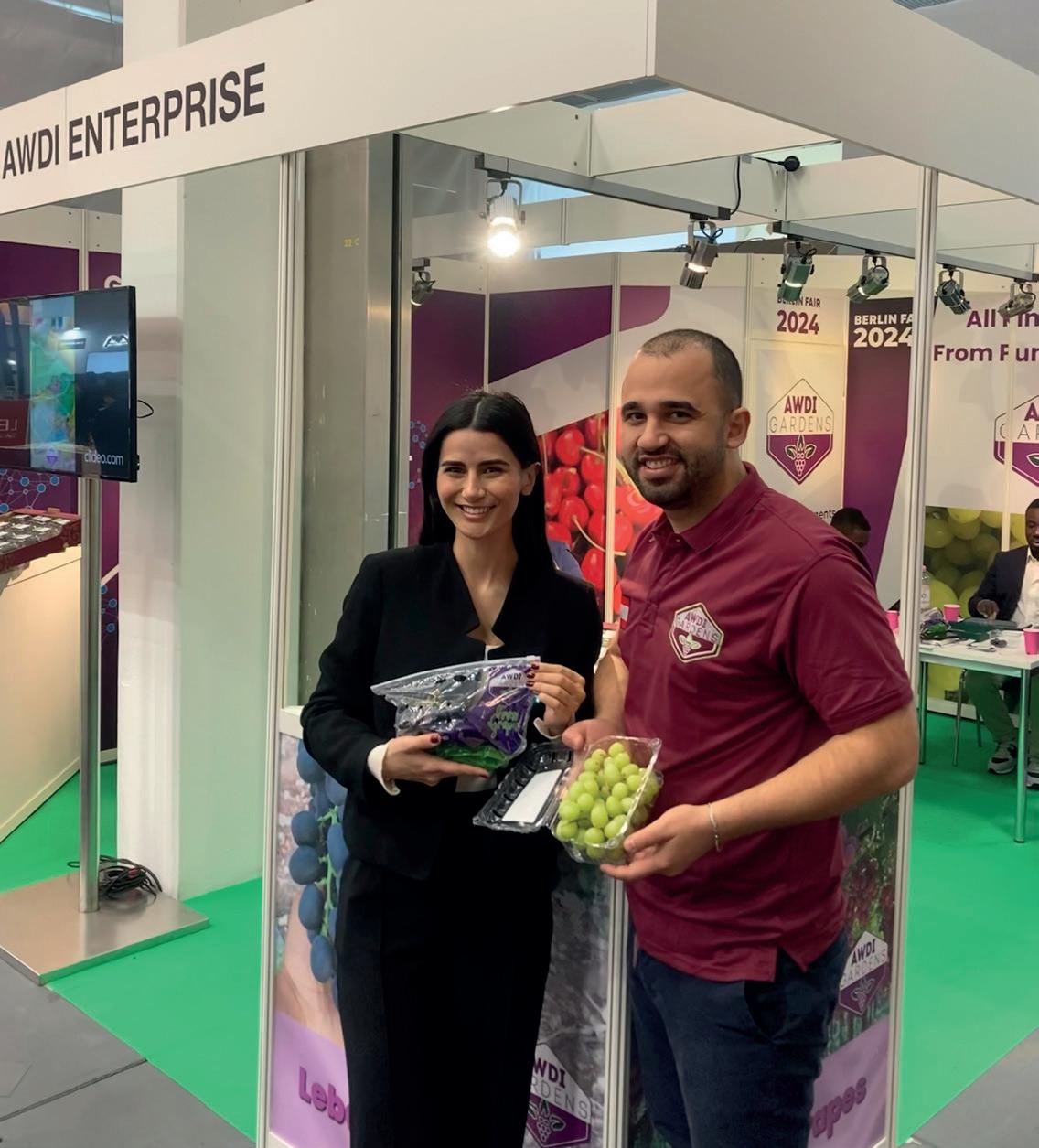
Lebanese grape exporter Awdi Gardens was thrilled to receive the Lebanese ambassador to Germany and former prime minister, Mustapha AdibAbdul-Wahed, during the company’s first time exhibiting at Fruit Logistica in Berlin.
“He visited us and told us how proud he was of the work we’re doing to represent farmers in Lebanon, create jobs and invest in the economy, especially with everything currently going on in the region,” says the company’s Dalia Awdi.
The family business has its own grape production, but the company also sells for other producers in the country. “Ours is a family business,” she says. “My mother, my brother, my uncle and my cousin are all here in Berlin. With the issues in the region, not just the war in Gaza, but the economic crisis in Lebanon since 2019, the work we do is more important than ever. We are actually US citizens, but our family has made the choice to keep the business growing and continue to produce in Lebanon. Farming is a huge sector in Lebanon, and we want to elevate the
image of Lebanon globally.”
Awdi Gardens is one of the largest exporters of Lebanese table grapes, exporting around 4,000 tonnes a year. “The volume has increased a lot,” adds Dalia’s brother, Ghassan Awdi, the company’s vice president. “We’ve been in the business for generations, but we’ve been focused on exporting grapes only for the last four years. We discovered the potential for Lebanon globally and recorded exponential growth since then. Now we want to open up new markets and introduce Lebanon to new parts of the world. Mongolia, Philippines, Canada –these are all new markets that we see good potential in.”
The company also sees possibilities for growth in Europe, and not just for grapes. “We’re very well set in Asia and Africa,” he says, “but because our grape volumes are growing, and we’ve also seen some potential for products like kiwifruit and plums in Europe, we want to have a bigger foothold in that market. There’s a lot of demand.”
“We have international ambitions,” adds Dalia. “Everyone traditionally goes to the Gulf markets, but because we’ve lived all over the world, including in the US and UK, our minds are not limited. So we’re thinking of all these other markets. For example, we have introduced our grapes to Nigeria and Malaysia. The demand was already there in the Gulf markets, but because of our international ambitions, and our connections and our exposure abroad, we have looked to new markets.”
Awdi’s main grape varieties remain Crimson and Red Globe. The aim, according to the company, is to introduce new varieties, but first of all Lebanon will probably have to join the International Union for the Protection of New Varieties of Plants (UPOV) to ensure Lebanon receives the best varieties. “Hopefully breeders and nurseries will give Lebanon a chance to grow some of these new varieties they’re developing soon,” says Ghassan.
A crucial factor in the company’s success, says Dalia, is the taste of Lebanese grapes. “They truly are delicious,” she insists. “We have a great climate in Lebanon. Many of our customers prefer Lebanese grapes, and Lebanese people living abroad prefer Lebanese grapes and seek them out. We’re lucky to have such a beautiful climate that allows us to produce such amazing fruits and vegetables, all naturally grown. Our country is small, but its geography is diverse.
“Our customers have been asking for other fruits, so we see potential in cherries, plums and kiwifruit. Our grandfather’s first farm was a kiwifruit farm. The climate in Lebanon is good for such fruits. We’ve always enjoyed the best fruit and vegetables from each part of our country, and we now want to share them with the world.” E
ABOVE—Dalia and Ghassan Awdi at Fruit Logistica in Berlin












Providing with the best technology and innovation strategy in the production of plastic film for vineyards covering.
DO YOU WANT TO KNOW MORE ABOUT US? VISIT > serroplast.it

In less than a decade, the world’s only variety to be named by consumers has rocketed into the US apple market’s top ten. Now, the brand looks set to continue its stratospheric rise in Europe.

EKATHRYN GRANDY Chief marketing officer Proprietary Variety Management
ight years ago, no-one knew Washington 38. We had to find a brand name. After a lot of sensory testing, we began to brainstorm.
Somebody said, this apple is so beautiful and red, and the lenticels are like stars in the sky. How about the ‘cosmos’? We thought about the fact it’s a cross between Honeycrisp and Enterprise. Somebody suggested Cosmo Crisp, another said Cosmic Crisp, and 95 per cent said this was a great name. It was the first apple ever to be named by consumers.
Fast forward to today, and we have hundreds of family farms in Washington State growing this apple, investing millions of dollars. They really needed a new apple, because Red Delicious was going away. Their hopes for the future rest on Cosmic Crisp’s future success.
People wanted something happy and something aspirational and something new. In Cosmic Crisp, a star was born
But first we had to tell our story. We went across the US and met with journalists, and explained to them that the breeder scored this apple five out of five on texture, colour, flavour, juiciness, and crispness.
We also explained that this apple was naturally bred, that it’s one of the only apples to have a mother tree, which still stands in Wenatchee, Washington. Journalists were captivated, but we had no apples to share yet, because it was so new.

Our growers planted millions of trees. Then we promoted hard and found ourselves in Time magazine and on NBC. People wanted something happy and something aspirational and something new. In Cosmic Crisp, a star was born.
In December 2019, we shipped them across the country. I was at one store in Seattle an hour before it opened, and there was a huge swarm of people outside.
They weren’t waiting for the new Apple iPhone. They wanted Cosmic Crisp, and had driven from Canada, Oregon and all over Washington to find it. The
excitement was phenomenal and began to spread internationally.
In the US, 21m apple trees have been planted in Washington State alone. It’s the largest launch of a single variety ever. And it has also been planted in ten regions of the world. We have phenomenal partners, like Vip and Vog in Italy.
Out of hundreds of varieties sold in the US, Cosmic Crisp is now the seventh most-popular. We sell 8m boxes a year in about 18,000 stores – including Walmart, Costco, and Aldi.
A recent Nielsen retail study showed that our retailers across the US view Cosmic Crisp as their number one opportunity. E


European production of new club variety set to reach 20,000 tonnes by 2030, according to brand owner Fresh Forward.
by Mike Knowles @mikefruitnet
BELOW—Bloss is said to offer a high tolerance against scab and powdery mildew
BOTTOM—The variety’s branding was unveiled at Fruit Logistica
Producers in Germany, Netherlands, and Switzerland have put their faith in Bloss, a dark-red apple that they believe offers an authentic, tastier eating experience for consumers and a more sustainable product for growers.
The variety’s new brand identity was presented to the global fresh produce trade at Fruit Logistica 2024 in Berlin. The name itself is a combination of bloom and blossom, and is accompanied by natural colours and a stylised image of a grower.
According to its marketers, Bloss is one of a new generation of apples with a high tolerance against scab and powdery mildew, two of the biggest challenges in modern fruit production.
“With this newcomer we have something special on our hands, an apple with a beloved taste,” comments Tim Kievits, brand manager at FruitMasters.

According to the company, Bloss offers above-average pack-out rates and consistent sizes, and has proven “a good fit” for today’s climate.
20,000 forecast european bloss production in tonnes by 2030
“This was evident from the many positive reactions during the fair. Wonderfully juicy with a sweet, tingling taste and crunchy bite.”
Dutch fruit breeder Fresh Forward owns the variety, which is known internally as Wurtwinning.
During recent consumer tests, Bloss apparently scored highly as a result of its “sweet, zesty taste”, its “strong aroma”, and “crisp bite”.
The apple is grown by Royal FruitMasters in the Netherlands, Tobi Seeobst in Switzerland, and Elbe Obst, MaBo, WOG, Landgard, Frutania, and M.AL in Germany.
Production currently stands at 180ha in Europe, with plans in
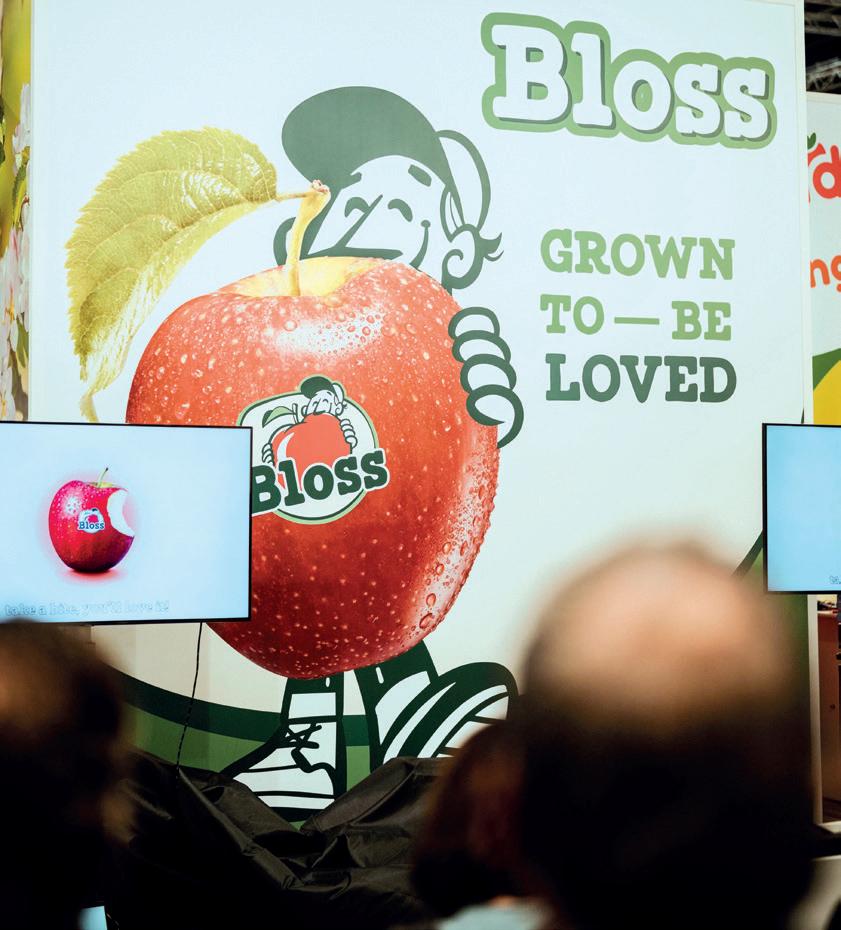
place to add 900ha more in the next five years. Eventually, the Bloss harvest should reach 20,000 tonnes by 2030. E
New investments in operational infrastructure across the group put it on a secure footing for the future.
by Maura Maxwell @maurafruitnet

BayWa Global Produce continues to expand its sourcing and marketing footprint as it positions itself to meet growing global demand for fruit and vegetables. An extensive twoyear investment programme to increase sorting, packing, storing, and ripening capacities and improve process efficiency using state-of-the-art technologies has placed the group on a secure footing for futureoriented growth.
CEO Benedikt Mangold says 2023 was a challenging year in various respects. “Inflation-driven high prices for energy, operating costs and food influenced European consumers’ purchasing decisions and resulted in a challenging sales season for apples and exotics, while in the Southern Hemisphere, our New Zealand business was impacted by the volume losses following Cyclone Gabrielle,” he tells Eurofruit
This year, however, the outlook is altogether more favourable. Mangold says the European market environment is significantly improving,
The
group has increased sorting, packing, storing and ripening
capacity and improved efficiency with state-of-the-art technology
with consumption data showing promising figures, especially for apples.
And a er the severe weather events a year ago in New Zealand, the group sees good signs of recovery, with a promising crop of Scifresh and Scilate apples, branded as Jazz and Envy, coming through.
According to Gareth Edgecombe, CEO of T&G Global, the company has done a remarkable job in cleaning-up and re-building impacted orchards following Cyclone Gabrielle in Hawke’s Bay. “As a result of the hard work, together with new plantings beginning to bear fruit and great weather over the summer, we look forward to increased export volumes this year – and this will continue to grow year-on-year into the future,” he says.
Following extensive investments across its subsidiaries, Mangold says BayWa Global Produce is well prepared for its future-oriented growth strategy. In the coming years, the company’s focus will be on increasing its global footprint and creating more stable supply chains. “Our Envy expansion programme – including new plantings – will contribute to growing volumes, helping us to
extend our market position and to access new growth markets across Asia,” he explains.
“We will also extend our verticalisation in key exotic products like avocados and mangoes to ensure shortest possible value chains through direct access to fresh produce at origin.”
The final plank of BayWa Global Produce’s strategy is continued R&D in new genetics and growing systems. Here, T&G’s VentureFruit business will play a major role in partnering with breeders and the commercialisation of new varieties.
One example is the joint venture BayWa Global Produce set up with Spain’s Nufri to grow premium blueberry varieties developed by VentureFruit and associated breeding programmes in Huelva.
“Building on Nufri’s expertise we have plans to expand the current farm with new varieties from VentureFruit delivering consistently large, tasty berries with a longer shelf-life, increased productivity, and greater resistance to pathogens,” Mangold says.
“Pending approval by the European Commission, we are planning to market the first volumes from our joint farm this season.” E

Marc Evrard of Belgian Fruit Valley talks to Eurofruit about some of the issues behind the farmers’ protests across Europe and the effect of the disruptions in the Red Sea on trade flows to East Asia.
by Tom Joyce @tomfruitnet
Following the farmers’ protests across Europe, the EU Commission has offered various concessions on diesel subsidies and pesticide reduction targets. Can you tell us what this could mean going forward?
Marc Evrard: There are lots of issues being thrown together. It’s about CO2, it’s about packing materials, it’s about the Green Deal, it’s about using fewer plant protection products, and it’s about growers feeling like they’re le with li le to make sure their product is delivered to the consumer.
The issues that a pear grower might have will be different different from a wheat producer or a pig
LEFT—
“We have been in discussions about the Green Deal for the last few years, and every time our arguments have been swept off the table
farmer. But the common ground seems to be that this approach is not working. When you look at our specific industry, talking about apples and pears, we have been in discussions about the Green Deal for the last few years, and every time our arguments have been swept off the table.
Take packaging, for example. Plastic was deemed bad, so instead of a recyclable clamshell of cherries, people can choose a paper bag. What people don’t realise is that it’s actually a multi-material bag which cannot be recycled. And on top of that, the production process is more expensive and more harmful to the environment. I’m not saying we have to go for plastics all the time, but we should understand what we are talking about.
And this goes for a lot of the different issues that have been put on the table. Which leaves growers with a very uncomfortable feeling. Nobody’s saying they are against a more environmentally friendly world. But it doesn’t happen just like that.
Policymakers haven’t given enough consideration to what people inside the industry were saying, and now what’s perhaps even more harmful is you have these protests, and all of a sudden certain decisions that couldn’t be delayed or changed get postponed for ten years and all this money becomes available. So the democratic process has been discredited. This kind of precedent gives me an uncomfortable feeling.
Have you been affected by the longer transit time to East Asia due to the disruptions in the Red Sea?
ME: The additional time it takes to circumnavigate South Africa is not the main problem. Due to slow steaming and the addition of extra ports to some routes, the transit time between Antwerp and Hong Kong has increased from 18 days in 2008 to around 32 when the Suez Canal is open. So an extra ten days on top of that is not such a concern. We can ship our Truval Conference pears for a month and then they will keep in coldstorage for another month or so.
But you plan for the entire season, preparing so many containers for this week, so many for that week. So it’s important, especially with the big promotional programmes running with the retailers, such as for Chinese New Year, that everything gets delivered on time.
But at the start of January, as the disruptions in the Red Sea started, vessels already en route had to turn around and get out of the Mediterranean to make the detour around the Cape. That takes more than ten days, which means the vessel that le from Antwerp a week later will arrive around the same time. So you’re at risk of having no product one week and then too much the next, and that’s slightly disruptive. In addition, all those vessels have to make the same detour on the journey back. E
As the spiritual month of Ramadan begins in the Middle East, Rockit is celebrating with a new campaign in stores across the GCC countries.
by Carl Collen @carlfruitnet
The Rockit apple brand is introducing a new campaign linked to Ramadan, following what it called ”strong success” across Gulf Cooperation Council (GCC) countries over the past three years.
“Creating healthier gi ing options and leveraging consumer occasions is a key part of our sales and marketing strategy”
The month of Ramadan is one of the peak sales seasons for the snacksized apple brand, with sales across the Middle East jumping over 30 per cent year-on-year (March 2023 vs 2022).
Rockit market manager for the Middle East Ziad El Chawa said the apple brand was aiming to enrich the

lives of its consumers “so they can celebrate this special month and its values in new ways every year”.
“Creating healthier gi ing options and leveraging consumer occasions forms a key part of our sales and marketing strategy, and this year we’re offering families a fun, creative and informative way to celebrate together during this holy month,” said El Chawa.
“Our limited-edition Ramadan gi box includes a special 30-day advent calendar packed with useful activities – including fitness challenges, mathematical equations and fun general information – to help families educate and engage with their children.”
Suha Dassouki, Rockit marketing executive for the Middle East, said that alongside the promotional displays in store, Rockit is celebrating Ramadan with extensive online activity.
“Ramadan holds great value for our people and our business, and therefore we’ve been working hard to deliver engaging content that our consumers can interact with, to create a special overall experience during Ramadan this year,” Dassouki noted. ”Our GCC social media followers also have the opportunity to win one of 40 air fryers throughout the Ramadan period.” E





ITALY F.lli Clementi SRL (BZ) VOG coop. soc. agr. (BZ)

Rivoira Giovanni & Figli SPA (CN)
Sanifrutta Soc.Coop.R.I. (CN)
SERBIA Verda Vivo Doo Novi SAD
SWITZERLAND ISEPPI Frutta SA
FRANCE SARL Mesfruits BIODYNAMIC BIO MERAN
Copefrut’s general manager, Andres Fuenzalida, sets out the company’s ambitious sustainability and growth agenda.
by Maura Maxwell @maurafruitnet

ABOVE—Andres Fuenzalida, second from left, with some of the Copefrut team
RIGHT—The company is a leading supplier of organic apples
OPPOSITE— Copefrut supports the communities in which it operates with educational and food donation programmes

Andres, how would you sum up the outlook for the new Chilean apple season in terms of production?
Andres Fuenzalida: Both flowering and fruit set have been good in the orchards so we have high expectations regarding this year’s crop. Moreover, the fruit thinning process was successful, allowing for adequate loads on the tree. All in all, I would say it is shaping up to be a normal season in terms of volume, size profiles and quality.
Given the fall in European production last season, are you expecting the market to be relatively empty and prices to be strong?
AF: It is true that we have seen a significant drop in volumes from Europe in some varieties, but this does not always mean high prices, especially when it comes to a commodity like apples. Last year we had already had important adjustments in supply and I think that in several European markets expectations were raised but were not met.
In this regard, we must continue to be very careful and make sure that each season we plan the correct programmes that will deliver the correct return to our producers.
Roughly how do you split your shipments between Europe, the US, Latin America, Asia and other markets? Is this changing?
AF: Historically, our market share has been quite evenly split, with 35-40 per cent going to Europe, 30-35 per cent to Latin American markets, 10-15 per cent to Asia, 10 per cent to the US and just under 5 per cent to the Middle East. However, in recent seasons we have been ramping up our presence in Latin America, and this has become our main market for traditional apples – particularly Galas, for which it represents more than 65 per cent of our volume.
Varieties like Pink Lady continue to be highly concentrated in Europe because the club model requires that we work only with the brand’s licensees. It’s only in the last season that there was an opening to commercialise Pink Lady in Latin America royalty-free, enabling us to introduce the variety to the consumer. Overall, we had a positive reaction in more developed markets such as Brazil, where supermarket chains helped to market the variety properly.
Generally, I would say we’ve seen an upswing in apple sales to both Colombia and Brazil, as well as in Central America, Ecuador and Peru among others.
We believe that, just as US and European growers market a large part of their production locally, we too should look at our regional market in the same way. In seasonal markets, our presence will increase only when their local supply is affected, usually because of the weather.
Last May, Copefrut achieved a major sustainability milestone when your organic apples became the first agricultural product in South America to achieve CarbonNeutral Product certification. What other progress have you made in terms of your sustainability strategy?
AF: Perhaps the biggest milestone we reached in 2023 was the launch of our first-ever sustainability report. We see this as an exercise in transparency, self-diagnosis (to know where we are and where we want to get to) and collaboration between the entire company (more than 30 people across eight departments), which generates awareness and helps foster a culture of sustainability at Copefrut.
One of the areas where we’re making huge efforts to be more efficient is in our energy use. We have launched an Energy Management System that is now being rolled out throughout the company through staff training, operational changes and other strategies.
We’ve also carried out a macro feasibility study for the implementation of nonconventional renewable energy sources in the fields of our strategic producers.
Sustainability is not just about the environment, but also about social development and quality of life. In 2023 we launched our Inclusion and Diversity policy and
created a Committee for Equity and Good Labour Practices. We have also created alliances with local educational centres to attract talent and contribute to their training, since an educated society will contribute to sustainable development. Along with that, we have committed to donating fruit to those most in need. And we’re
The second is capacity: when it comes to growing the business, we think it’s important to get closer to our producers and customers, always ensuring the capacity and quality of all processes. For example, our goal is to double our cherry processing capacity in 10 years thanks to the installation of more than 130 new lines. The third

working with rural drinking water associations close to our operations to help them ensure a safe water supply.
Going forward, what are the main projects you have lined up for the rest of 2024 and beyond?
AF: Right now, we are in the process of implementing a strategic plan that we created a couple of years ago and reviewed in 2023 to ensure that we’d be able to execute it with the greatest responsibility and effectiveness. It is a bold and ambitious plan that has four key pillars. The first is fruit loyalty: we want to develop association models, alliances and attention to our producers that allow us to always have the best volumes and quality standards in cherries, apples, kiwifruit and plums.
“Just as US and European growers sell a large part of their production locally, we too should look at our regional market”
pillar consists of continuously improving our efficiency and automation, ensuring lower risks and greater competitiveness.
And finally, there is internationalisation: improving our value proposition for customers around the world, deepening our presence in all markets and, especially, in China. We recently took a gamble with the launch of our new brand for the Chinese market, recognising the importance of acting locally, even though we are a global brand. E
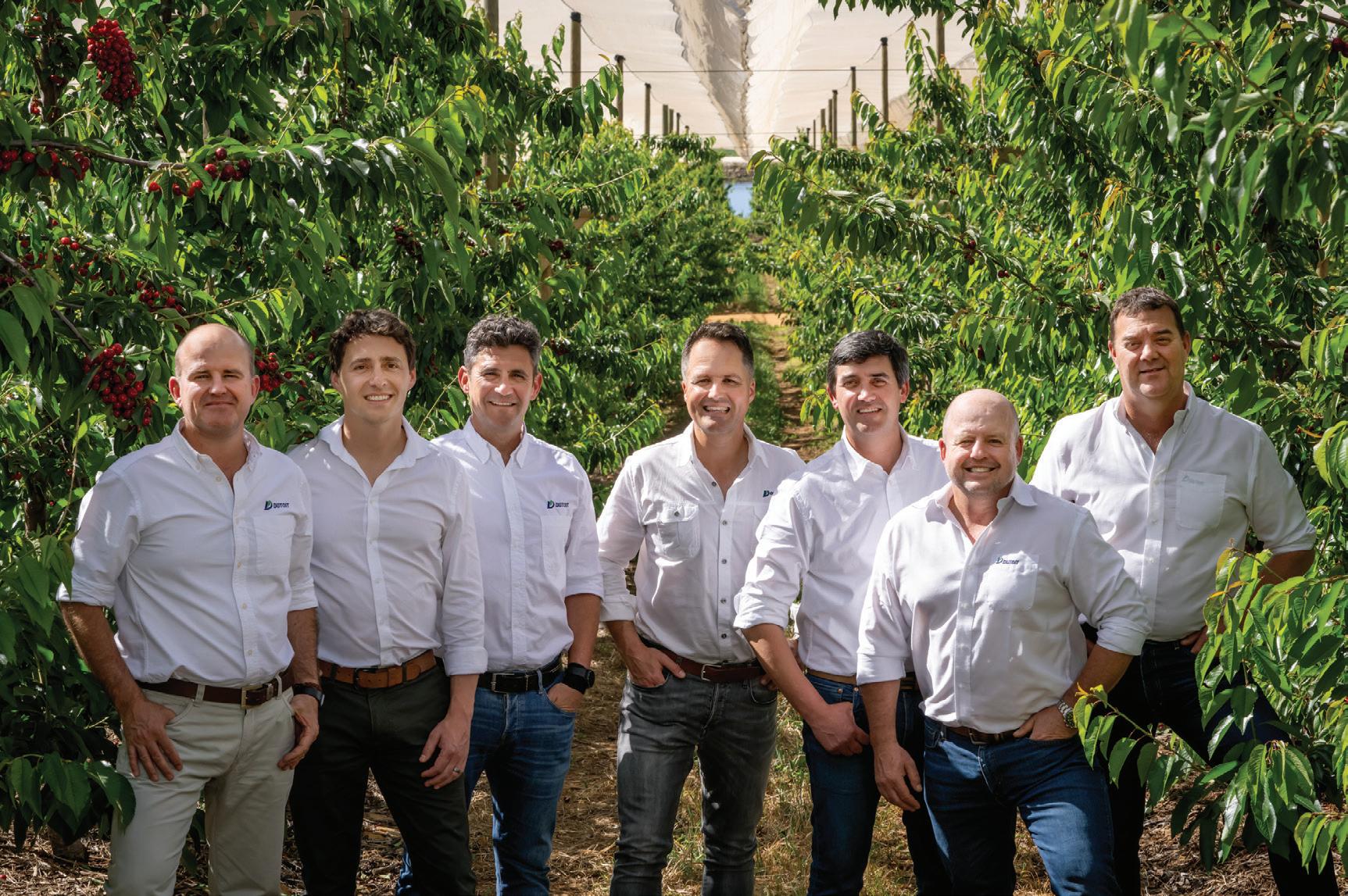
Diverse products and investments are core elements that help South Africa’s Ceres-based Dutoit Group absorb the risks and volatility of the agriculture industry.
by Fred Meintjes
It is not often that companies in the fresh produce industry endure for 130 years. Yet, that is exactly what South African fresh produce grower and marketer Dutoit Group has done.
Founded by the legendary Gysbertus du Toit on the family farm, Kromfontein, the entrepreneurial focus and constant renewal and innovation of the group has endured into the new century, with a young team of the fourth and fifth generation of Du Toits now ready to take it to new heights.
Two of the South African
fruit industry’s best-known personalities, Gys du Toit senior and Pieter du Toit senior, recently handed over to the next generation of seven Du Toit cousins to take the business into the future. In speaking with this young team, one gets a sense of great pride and respect for those who went before, especially in the leading roles played by the late Jan-Linde and Gysbert du Toit, grandsons of the founder.
“Through diversification we are able to reduce the impact of negative downswings in the business, some of which are
seasonal (short-term) and some are cyclical (longterm),” says Hennie du Toit, CEO of the group in summing up Dutoit’s recipe for success. “Our core strategy revolves around offering a wide range of products, cultivars, and making diverse investments across the agricultural value chain. This approach not only fosters innovation but also enhances the resilience and sustainability of our operations.”
Long-term growth remains at the heart of the business, and this is driven by a culture of entrepreneurship, he outlines. “However, we acknowledge the importance of balancing growth with internal consolidation at strategic intervals to ensure sustainable success.”
Willem Coetzee, managing director of Dutoit Agri, the integrated operational subsidiary of Dutoit Group, says it has always believed in running a sustainable business. “Operating as a sustainable agribusiness involves prioritising environmental and economic sustainability, social responsibility, and adaptability,” he says. “By emphasising these pillars, agribusinesses can establish a sustainable model that ensures profitability while positively contributing to the environment, society, and economy in the long term. Ensuring the long-term sustainability of our business is paramount, with a commitment that extends even beyond the next 130 years. This commitment is exemplified through our social contribution,
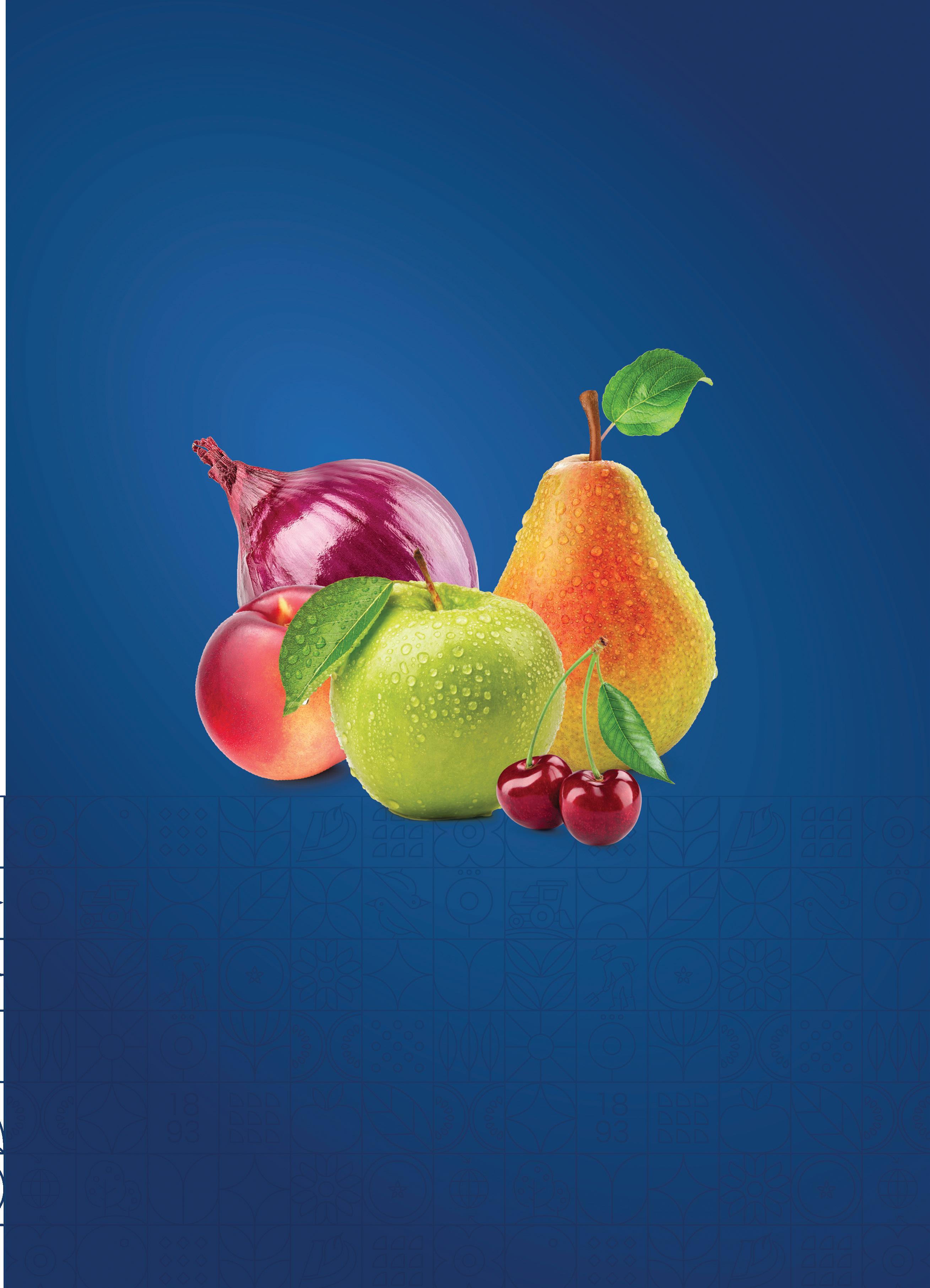
Since 1893, the Dutoit Group has meticulously perfected its craft, nurturing the finest fruits and vegetables as a leader in South African agriculture. Embark on a flavourful journey through history as Dutoit continues to weave its timeless charm, connecting hearts and palates across continents.
Dutoit invites you to savour the essence of South Africaone delicious bite at a time.

which extends not only to our 9,000 employees and their families but also to our local communities, as well as the indirect impact throughout the ecosystem.”
Viewing challenges in agriculture through this lens puts them in perspective, making them seem more surmountable. “Nevertheless, it is crucial to acknowledge the numerous obstacles that currently confront us,” Coetzee continues. “Our guiding principle is to concentrate our efforts where we can effect change – on the areas within our control. For those aspects beyond our immediate influence, we strive to make a difference by actively supporting industry organisations and initiatives.”
The Dutoit Group involves a huge community of people on its fruit and vegetable farms in the Western and Eastern Cape. “We have a passion for our people and respect for our natural resources (water and soil); without them it is very difficult to take on any new
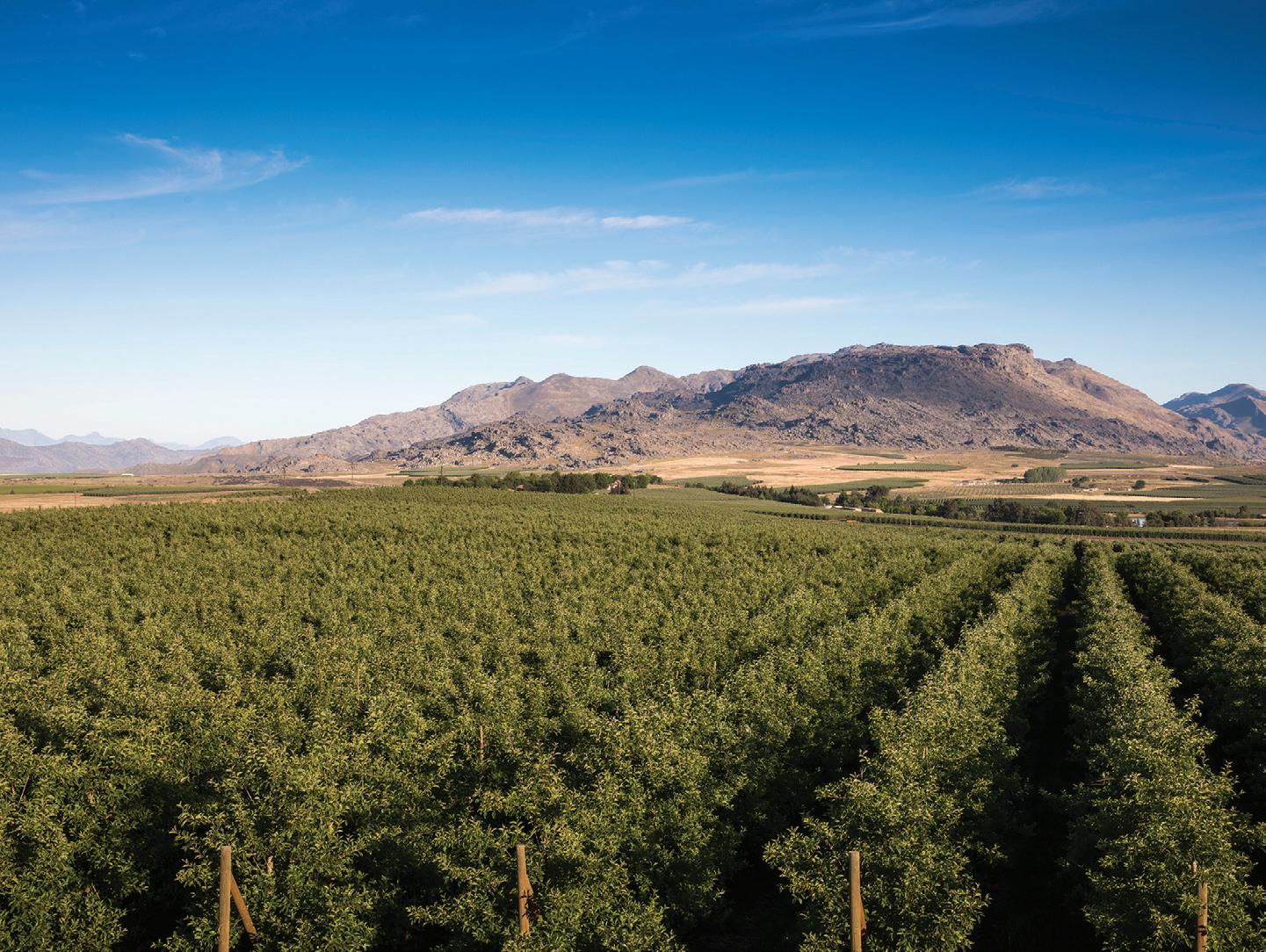
challenge,” says Coetzee.
The group conducts its business as socially responsible citizens in South Africa, he confirms. “Our farms, coldstores, packing facilities and the other business entities we associate with, make a meaningful contribution to job creation, directly and indirectly throughout the value chain. Our farms provide a whole range of social services, and we invest in educational facilities and programmes which are vital for the rural community.”
While the challenges are big, the Dutoit Group is very positive about the future of agriculture in South Africa and our people and the potential positive change it can all bring. “We see ourselves as custodians of the beautiful land we farm and would like to improve it for generations to come,” says Coetzee.
The message is clear. The Dutoit Group has embraced sustainable farming and adapted production processes to reduce the negative
impacts farming could have on the environment.
“We place a strong emphasis on soil health by restoring natural ingredients through organic composting, implementing advanced irrigation technology to reduce water usage, and minimising the use of harmful pesticides, among other initiatives,” he adds. “We understand our responsibility in the bigger ecological system and have been maintaining large areas on our farms as nature reserves.”
On what it takes to keep a family together for so long and what the ‘era of the seven cousins’ will mean for the Dutoit Group, Hennie du Toit notes: “We have different opinions, viewpoints, strengths and characters, but we have a common long-term goal. We leverage our internal diversity, united by a shared long-term goal, as a source of strength and an ongoing competitive advantage.”
Relationships and partnerships with co-investors are critical, he explains. “However, our relationships with suppliers, customers and our employees are viewed as our strongest long-term partnerships.”
What can be expected of the Dutoit Group in future? “More of the same,” says Du Toit. “We are constantly striving to enhance our operations and diversify our product offerings. Through our focused structures, we empower businesses to become industry experts. By prioritising good corporate governance, we cultivate a supportive environment that strengthens our core business activities.” E
The Dutoit Group says it is market-driven and has control over the product from the orchard to the market.
by Fred Meintjes
Amarket-driven philosophy has forced South African group Dutoit Fruit to be innovative and agile, according to director for fruit marketing Gysbert du Toit.
“We believe we must invest in plant products and varieties that we anticipate the market and consumers want and will appreciate for the next 20-30 years,” he tells Eurofruit. “We therefore must be innovative in how we do this efficiently in order to ultimately be competitive in the market and earn a good return on our investment in order to be sustainable.”
The group exports apples, pears, cherries, nectarines, and plums under the Dutoit brand, which is found in markets around the world.
Du Toit says apples are the most important commodity, followed by pears. “We have seen exciting growth in cherries over the past

few years and plan to increase production during the next three to five years. We are also renewing and expanding our nectarine offer and maintaining our plum business, which is growing. In a South African context, I am excited about the market window we have for kiwifruit.”
The Dutoit brand and reputation is one of the

group’s most important assets, he continues, with its commitment of “always show dedication” demonstrated by long-standing relationships with business partners, customers, suppliers, and employees.
Du Toit emphasises that, in today’s challenging logistics world, one must be very adaptable, relying on long-term service providers and partners. “We are shareholders in Link Supply Chain Management where the team of experts manage our needs,” he outlines. “Obviously seasonal strategies and planning need to be in place so they can contract with the different service providers and shipping lines.”
The fact that Dutoit’s farms are located over a large area in the Western and Eastern Cape is very important to ensure stable market supply. “Weather patterns are changing and that’s why we must be innovative in what, how and where we farm,” says du Toit.
The group will continue to take note of consumer and market trends when investing in varieties, maintain good relationships and be relevant in the market and for the customers it supplies. “We also invest in new markets and produce varieties and quality of fruit so that you have marketing options,” he adds. E
TOP—Apples are seen as the most important fruit commodity LEFT—The size and location of farms ensures stable supply

Dutoit Group’s subsidiary, Dutoit Vegetables, adds an extra layer of diversification to the business.
by Fred Meintjes
With improved varieties and therefore quality, the opportunities for South African vegetables are plentiful. This is the view of Pieter du Toit, commercial director of Dutoit Vegetables.
“Vegetables help us to diversify Dutoit Agri,” confirms du Toit, whose subsidiary produces vegetables in key climates in the Western Cape while utilising central packing facilities near Ceres.
Each year Dutoit Vegetables ships around 500 containers of onions and 100 containers of sweet potatoes. The vegetable category contributes around 20 per cent of Dutoit Agri’s turnover annually.
Dutoit Vegetables produces onions and sweet potatoes for the fresh market, and potatoes for processing. Within the onion category it produces and packs brown, red and sweet onions, as well as shallots. Potatoes are entirely grown for processing and are all locally consumed, while the group exports around 80 per cent of the sweet potatoes, both yellow- and white-fleshed licensed varieties, from the University of Louisiana in the US.
“We believe there is a huge potential to sustainably export onions from South Africa. Recently, we strategically decided to export more onions, particularly to the UK and the EU. We were very much
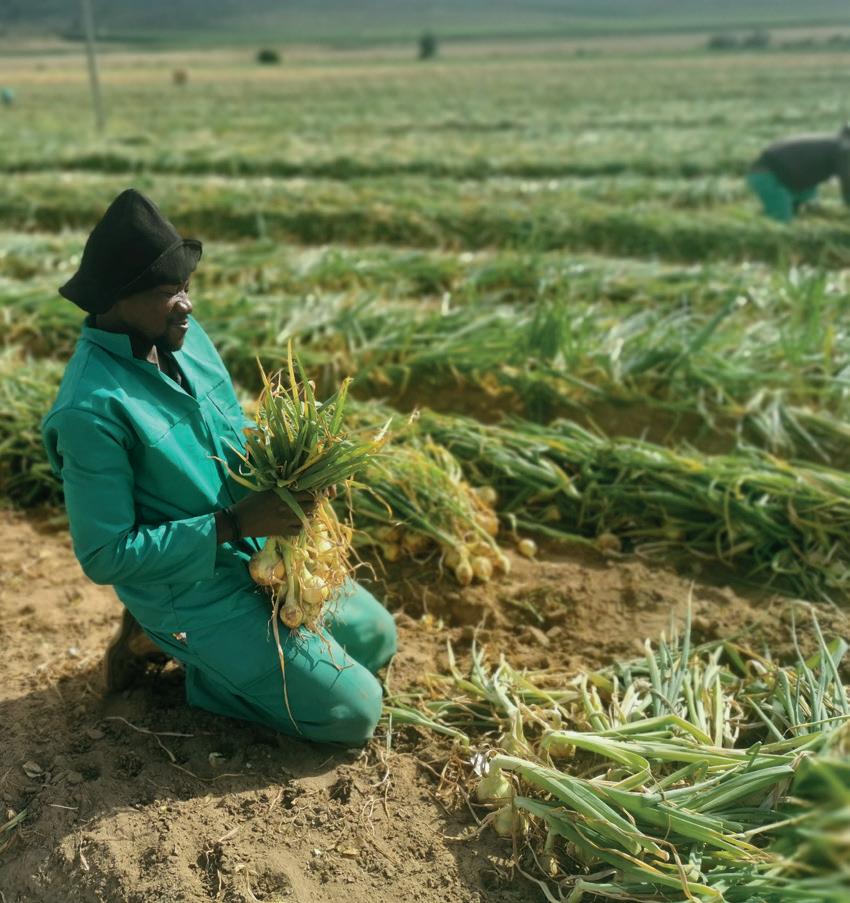

dependent on the local market and had to diversify where we sell our products. Inside Africa there is also still huge potential.”
Dutoit’s intermediate long-day varieties have improved over the years and the quality competes favourably with onions from New Zealand, Australia, and South America, du Toit explains.
Of the main category, around 30 per cent of onions are exported mostly to the UK, Europe and the Middle East, a further 10 per cent goes to neighbouring countries in Southern Africa, and the rest are sold inside South Africa.
“Sweet onions are relatively new and are currently only exported to Spain, but we see more potential as sweet onion consumption grows worldwide,” he adds.
Brown, red and shallots are shipped from January to April and sweet onions from November to January. The exports season for sweet potatoes runs from April to June, mainly to the UK and Europe. E
ABOVE—The potential to export onions from South Africa is “huge”, according to Pieter du Toit












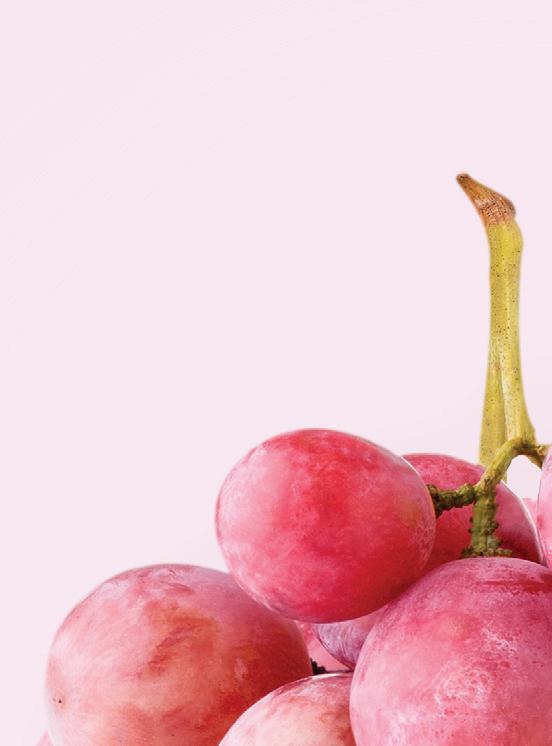


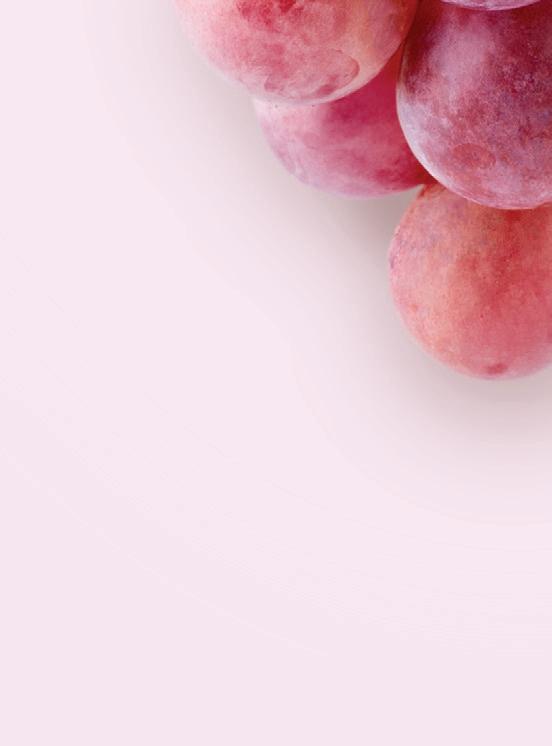
The campaign did not live up to expectations but wider access for South Africa-grown blueberries is still on the cards.
by Carl Collen @carlfruitnet
South Africa’s blueberry exports fell short of expectations in 2023, but industry leaders have said the fastexpanding business is still on track for further growth. During the past season South Africa exported just over 22,000 tonnes of blueberries, short of the 25,000 tonnes initially predicted.
“We had some difficult conditions during the harvest which slowed down picking and packing,” said Brent Walsh, CEO of Berries ZA. “We are also in a phase of introducing new varieties which positions us for long term growth.
“Our long-term forecast is still for considerable growth, and that is why we are keen to get access to
the consumer markets of the East, and India is one example,” he explained.
22,000
tonnes of blueberries exported by south africa in 2023
According to Walsh, South Africa is far advanced in its efforts to gain access for its blueberries in India. Final feedback is now awaited from the Indian authorities and the industry hopes to advance ma ers during Fresh Produce India in March.
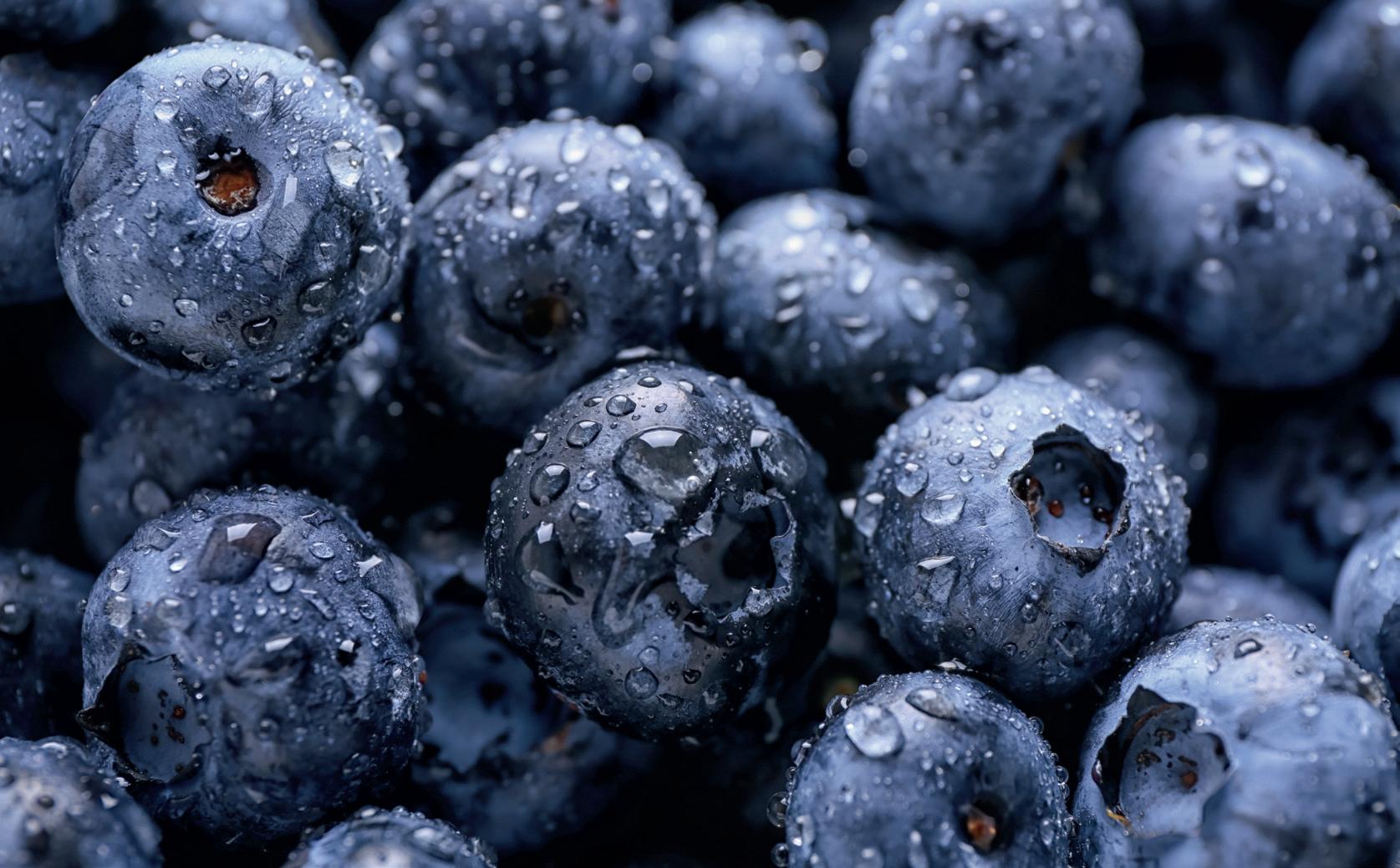

ABOVE—South Africa’s exports fell 3,000 tonnes short of the forecast
LEFT—Production is still growing in the country
South Africa has a growing blueberry industry and has in recent years recorded substantial growth in production. Last year’s lower crop was disappointing, particularly because there was strong demand and good prices to be had in traditional markets.
“Our competitors in Peru were also affected and this was reflected in the strong market,” he outlined.
As the industry looks forward, it is hoped that South Africa will be able to conduct its fi rst shipments to India as the new season picks up steam in July.
“This is assuming that the fi nal agreements are in place by then,” Walsh confi rmed.
“We can service the Indian market both by air and by sea, with some of our producers being in the north of the country and being able to ship their fruit from the east coast ports.”
In global terms South Africa’s blueberry production is still very small. However, growers in many parts of the country have in recent years invested in new plantings.
The Western Cape is still the major region of production and most of the fruit is shipped in containers from Cape Town or exported by air where this is required. E
Abril Blue+ and Alessia Blue+ meet needs of Peruvian growers for robust, resilient, high-yielding and flavourful varieties, company says.
by Maura Maxwell @maurafruitnet

Peruvian breeder Inka’s Berries will add two new blueberry varieties to its growing portfolio this year. Abril Blue+ and Alessia Blue+ have been developed with genetics generated in Peru and with the support of Inka’s breeding partner, the University of Georgia, with whom it has a long history of study and genetic development for premium varieties that can develop with the best quality performance and consistency.
The two varieties launch at a key moment, with recent climatic challenges faced by Peruvian growers amplifying the search for robust, resistant varieties, with great productivity and excellent flavour.
According to Ricardo Sumar,
manager of the genetics division of Inka’s Berries, both varieties have a post-harvest shelf-life of more than 70 days, large calibre (more than 70 per cent are bigger than 18mm), sweet flavour and a productivity of more than 4kg per plant.
With more than 15 years of experience, Inka’s Berries has laid the foundations for the growth and development of blueberries bred within Peru.
“A er facing complex situations such as the El Niño phenomenon, we have realised how important it is to change current genetics for those that are resilient to winter warming, tropical climates and any radical climate change,” said Carlos Gereda, executive president of Inka’s Berries.
“Today, the goal is to look
TOP—Recent climatic events have highlighted the need for locally-developed varieties
The International Blueberry Organisation (IBO) has appointed Mario Steta as its new chairman. Steta (pictured below), who is operations director for Driscoll´s in EMEA and formerly served as president of Mexican berry association Aneberries, brings extensive experience and knowledge to the role. He replaces Peter McPherson, who held the IBO presidency for eight years. His achievements include successfully hosting the IBO Summit in Australia in 2015, strengthening the organisation by incorporating new member countries including Poland, South Africa, and Morocco, positioning blueberries as a global leader in the fresh produce industry, and developing annual reports focused on providing comprehensive data and insights on global blueberry production.
Steta assumes the presidency at a time when the industry faces many challenges, such as the impact of El Niño on production, the war between Russia and Ukraine, and the hike in transportation and input costs. But McPherson noted that there are also many opportunities to grow, provided the industry maintains its focus on quality.
“Mario’s experience at the helm of a company that has stood out in recent years for the development and introduction of new and better varieties is undoubtedly an example for the industry to follow. If he can pass on that knowledge to our members, I am sure that the future will be bright and responsible,” McPherson said.
The expansion of supply and new production areas, coupled with transparency in information and the positioning of this superfood, are fundamental pillars of the IBO’s strategy.

for genetics that are ‘tropicalised’ and that have no problem producing under heat, with the aim of obtaining a product of excellent quality. Alessia Blue+ and Abril Blue+ arrive with the completeness and strength to face the new climate challenges that we are sure will be increasingly difficult.”
With more than 100ha planted with the two varieties, exports will commence shortly. E

Carlos Esteve tells Eurofruit why the company’s exclusive new varieties are an attractive option for European retailers.
by Maura Maxwell @maurafruitnet
One of Spain’s leading soft fruit companies is making a play for the autumn blueberry window to offer European customers a fresher and more sustainable alternative to berries imported from the Southern Hemisphere.
Huelva-based Onubafruit’s extra-early blueberry programme was born from a multi-year project to develop proprietary varieties that can be harvested when European supply is at its lowest. The result is a suite of new varieties covering the first part of the season which includes – but is not limited to – Demba, Dana, Selma and Aila.
Commercial director Carlos Esteve says the company is very happy with how the programme is progressing. “Our new exclusive
varieties are not only helping us to bring forward the start of our season but also to renew our plant material more generally since they cover more than just the extraearly window,” he tells Eurofruit
“To give you an idea of the numbers, in 2021/22 we did not have any new material in the ground but for the 2023/24 campaign our partners have planted 5m plants.”
Spain’s blueberry season typically starts in December/ January, with peak supply running from April until June. Onubafruit is one of Huelva’s biggest growers, producing around 15,000 tonnes of blueberries from a planted area of 1,100ha.
With its new varieties, Onubafruit can now harvest small volumes from September, but

ABOVE LEFT—The company is targeting Europe’s autumn blueberry window
ABOVE RIGHT—Carlos Esteve, commercial director of Onubafruit
continuous production is at present only available from late November onwards. As young plantations mature and others are replaced with the new varieties, production volumes are set to ramp up significantly.
“Being able to supply blueberries in that window is a great advantage since it allows us to provide a fresher and more sustainable product while also offer more flexibility to the customer,” Esteve continues. “For all these reasons, retailers are eager for availability to increase.”
This season, Onubafruit is hoping to capitalise on the sharp drop in Peruvian production due to the high temperatures caused by El Niño – although as Esteve points out, Spain is experiencing its own climatic challenges right now.
“The significant decline in Peruvian production is greatly affecting the blueberry market and this is having consequences for everyone in the industry. There is no doubt that less pressure on supply helps find space for our product, but it looks like we may have to revise our planned production downwards for this campaign because of the tough conditions we’re enduring,” he says.
Looking ahead, the cornerstone of Onubafruit’s blueberry expansion strategy will continue to be the development of new varieties that raise the quality bar and extend the company’s harvest window.
“We have tried to lengthen our production period, especially in the early part of the season, with varieties with no or low requirement for chilling hours,” Esteve says. “More recently, in the past year, we’ve also opened a new avenue of research to develop plant material with greater cold requirements.” E
Berry supplier shows no sign of slowing down as it celebrates its 10th anniversary.
by Maura Maxwell @maurafruitnet
Agrovision’s strategy to build a 52-week supply of premium berries hit another major milestone in February when it signed an agreement with the Longhua Residents Committee, Midu County, to establish its first blueberry farm in the Yunnan province of China.
The region’s warm tropical days and cold nights offer ideal growing conditions to supply premium fruit to China’s burgeoning blueberry market, which has been growing at around 40 per cent annually over the past five years. From an initial plantation of 33ha, the company plans to market its first commercial volumes in China in the first quarter of 2025. Eventually it aims to build up to 2,000ha of production in the country.
According to CEO Steve Magami, the deal marks the next step on the company’s promise of delivering the world a be er berry, year-round. “Eventually, our Chinese project will look like our Peruvian project, which at 2,000ha is the largest premium blueberry operation in the world,” he says.
In addition to China, Agrovision owns two farms in India and has plans to start farming in three other Asian countries, which it will announce in the next few months. Elsewhere, Magami says Agrovision is planting a “huge amount” of Sekoya varieties in Oregon, while in South America it is poised to step up production of organic blueberries in Chile to complement its conventional supply from Peru and Mexico. Closer to home Egypt is will soon join Morocco and Romania in the company’s EMEA production footprint.


company retains the culture of a start-up. “We have an incredible team. They work hard and are passionate about their mission.”
hectares of initial plantings in china
“We’re moving very fast,” says Magami. “We’re really commi ed to having a 52 week offer and we think that if we continue to put a premium product like this in front of people then consumption will skyrocket.”
Despite its meteoric growth, he insists that the
Having set out to revolutionise the blueberry segment, Magami says he now sees the same opportunity in raspberries and blackberries. Last year, Agrovision secured the European rights to grow and market Pink Star raspberries, developed by French breeder Marionnet Label, and it will soon start production
in Morocco. The two varieties sold under the label, Pandora and Gaïa, are also being grown in southern Spain and will eventually be available through 52 weeks of the year.
In blackberries, meanwhile, Magami says a new varietal launch is at least a year away. “We are just getting started, but we want to get it right, we’re not in a rush,” he concludes. E
TOP—Agrovision seals the deal with the Longhua Residents Commi ee ABOVE—The company is focused exclusively on premium varieties
Even in large, developed markets like Germany and France, says CEO Adam Olins, there are still big opportunities to sell more fresh berries.
by Mike Knowles @mikefruitnet
Whisper it quietly, but recent dramatic growth in sales of fresh berries might not yet have reached its peak.
That’s certainly a view shared at BerryWorld, one of the world’s largest and most successful berry suppliers, which celebrates its 30th anniversary this year.
“Ask a retailer what they want most out of the category, and they would say consistent supply of good-quality fruit”
As it entered its fourth decade, the group’s chief executive officer Adam Olins spoke exclusively to Eurofruit about the road ahead for the business itself and the opportunities he sees to grow the berry market further.
The headline conclusion from that interview was undoubtedly Olins’ assertion that the category’s expansion in Europe and beyond is far from complete.
“Supply gaps still exist,” he insisted. “I think if you were to ask a retailer anywhere in the world, what would they want most out of the berry category, they would say consistent supply of good-quality fruit. And I would say, although
we’re pu ing much be er fruit on the shelves than we did thirty years ago, there are still huge opportunities. It doesn’t ma er where you are in the world, from the US to Australia to China, everywhere. There are significant gaps.”
For Olins, the company’s almost unintended emergence as a vertically integrated business with a presence in several key parts of the supply chain like breeding, growing, and marketing, is among its most impressive feats over the past three decades.
“We’ve created a global business, and when we set out thirty years ago that was certainly not our intention. We were a marketing company in the UK, in a fairly traditional sense. We did it slightly

Suppliers like BerryWorld must act not only to satisfy that demand, but to build new opportunities at the same time, Olins added.
“I would almost think that, if we’re here in thirty years’ time, if we’ve done our job then we will continue to create demand and create these gaps, because the difference about berries I’ve always thought compared with other products is it’s got a short shelf-life. Your job is, in effect, to create demand. We continue to create demand, and now we’re pu ing be er products on the shelves.”
differently because we created a joint venture with Peter Vinson, one of the largest growers in the UK at the time. But over the thirty years, to establish a business throughout the supply chain which is sustainable, that is the key achievement.”
To watch the full interview, head to Fruitnet.com and search for ‘BerryWorld’. E

Berries and Citrus
We are specialists in the production of and supply a wide range of fruits and vegetables worldwide.
Our berry production is commited to Sustainability That’s why we invest in avant-garde agrotechnology and integrated production to achieve a perfect balance between economic, social and environmental goals.
We combine different origins managing an excellent varietal plan to guarantee the supply of quality and fresh berries all year-round.
Due to our experts technical team controlling the entire supply chain, we can ensure freshness and food safety from field to fork!

Winter production has returned in 2024 following last year’s mass shutdown in the wake of the global energy crisis.
by Mike Knowles @mikefruitnet
The Netherlands should produce as much as five times more strawberries in the winter months as it did during the same period of last year, according to one of the country’s leading growers.
Jong Fruit, which specialises in year-round supply of strawberries including the export-grade variety Inspire, witnessed a return to full winter production across the country recently a er last season’s sharp increase in energy prices forced several growers to pause their operations.
“This winter, there is lot more production than last year, because last year we had the energy crisis,” confirms Arian de Jong, the company’s co-owner and managing director. “I think now there is as much as five times more production in the winter than last year in Holland.”
The result was a surplus of supply on the market in early February, De Jong told Eurofruit “Now it’s the price which is a difficult story, because there is too much competition,” he explained at the time. “In weeks four and five there was too much volume.”
However, that oversupply was expected to ease as the market picked up in February and March.

Longer term, the future is bright for Jong Fruit. In January, it secured outside investment from Spanish group Surexport a er De Jong’s brother Rob van der Wouw sold his share of the business.
As a result, the firm now operates as a co-owned venture between De Jong, the Huelva-based company’s owners, and Spanish private equity firm Alantra, while Van der Wouw remains active alongside his borther as a Jong Fruit director.
“I think we can sell bigger volumes. We have a vision and a plan. We are going to change something in the market”
can sell bigger volumes together to the market. We can offer more secure fruit to customers. And when we do not have fruit available from one country, we can deliver from another and give another option.”
De Jong believes growth will be easier to achieve in future with support from Surexport and Alantra. “If we need more volume, we can organise it,” he says. ”We have a vision and we have a plan. And we hope we are going to change something in the market from now on.”
One small but significant change Jong Fruit has made this year is to focus solely on strawberries across all 24ha of its production site. “In the past, we did blackberries and raspberries. But the turnover last year was the same and the labour costs have risen about 20 per cent in the two years since December 2022. So we cannot do that anymore.”
ABOVE—Jong Fruit’s Inspire strawberry crop was available from week nine
“This means that we are a stronger company for the future, I think,” De Jong suggests. “We can make more things happen than were possible before. I think we
De Jong adds: “Now we have a different vision. When we cannot produce raspberries and blackberries in the Netherlands, we import them from countries where we can produce. So we can offer the same thing to the customer.” E
Europe’s largest collection of so-called ‘fruitvoltaic’ panels protects plants and allows light to reach them, as well as generating lots of energy.
by Mike Knowles @mikefruitnet
Araspberry producer in the Netherlands has invested in what is thought to be the European fruit industry’s largest solar panel installation to date. With state support, Martens van Hoof recently added a total of 24,206 photovoltaic cells to his farm, which is based north of Eindhoven.
But unlike conventional solar energy systems, this one sits directly above the raspberry crops. That’s because of its specially designed panels, dubbed ‘fruitvoltaic’, which allow the right amount of light to reach the plants below. They also cover and protect the plants from hail and intense heat.
According to German group BayWa, the system generates an industry record-breaking output of 8.7 MWp – enough, it says, to power more than 2,800 Van Hoof’s decision to part-fund the installation and therefore cut his energy costs apparently stems from a pilot he ran at the site in 2020. With help from BayWa and its subsidiary GroenLeven, he plans to extend the project to cover his entire operation.
BayWa Global Produce’s sister company BayWa r e Global recently secured €6.5m in funding from the EU’s Life Programme.
The firm says it will use this

LEFT—Van Hoof’s farm will host 24,206 solar panels fixed above his crops BELOW— Photovoltaic systems form a key part of BayWa’s future energy plan

money to combine agriculture with solar power generation at six different sites in five EU countries by 2027.
“The combination of energy production and fruit farming at scale, or fruitvoltaics, will be supported in Spain, France, and the Netherlands, contributing to increased resilience against climate change,” BayWa Global
Produce in a post on LinkedIn. “Additionally, projects in Spain, Germany, and Italy will explore the expansion of [agri-photovoltaics] alongside field crops.”
The post continued: “We fi rmly believe that with the right grid infrastructure, this technology represents one of many crucial steps toward a more sustainable future.” E
Zac Bard and Wim Destoop outline the multinational’s strategy for unlocking European demand.
by Maura Maxwell @maurafruitnet
With a global production footprint spanning five continents, avocado giant Westfalia Fruit knows better than most the challenges the industry faces in securing sustainable and profitable growth in the years ahead. Global production is on course to hit 12m tonnes by 2030 – three times what it was at the start of the decade –and it’s clear that both established and emerging markets will have a role to play in absorbing this extra volume.
Fortunately, here in Europe, the multinational believes there’s plenty of room for growth in the market. “There are still opportunities in Europe for sure, both in terms of market penetration and increasing the value of sales,” says Wim Destoop, Westfalia’s Europe president. “Most of the markets in Western Europe are already well developed, but if you look at Italy, for example, there’s plenty of potential for growth. And Eastern Europe is a big opportunity for avocados as well –starting with Poland.”
He points to the success of the Hass Avocado Board in driving consumption growth in the US avocado market and suggests the World Avocado Organisation can play a similar role in Europe. Presently, growers pay €0.01 for each kilo of avocados sold in
Europe, which is used to fund marketing programmes and consumer research.
“It’s taking our marketing to the next level,” he says. “Consumption is completely different in the UK, Germany, Italy and France. We need to fine-tune our communication and marketing platforms to be sure that we really know when consumers eat avocados, so we can focus on increasing that consumption.”
Zac Bard, Westfalia’s business development executive, says he’s more optimistic than ever about the future of the avocado market. “The snowball is starting to grow,” he tells Eurofruit. “We have a year-round supply of good quality avocados that are going to every corner of Europe. I see a lot of scope for the European winter areas to grow – we’re seeing plantings take off in Huelva, Cádiz, Valencia and other parts of Spain. Then you’ve got new origins like Colombia, Ecuador and Guatemala that are growing nicely and will be able to balance summer and winter supply.
“With the good work that the WAO is doing, a little bit of a break in Peruvian plantings and Asian growth, things are looking very positive. If we grow Asia by 15 per cent a year then in four or five year’s time, Europe is going to start feeling short of avocados, even
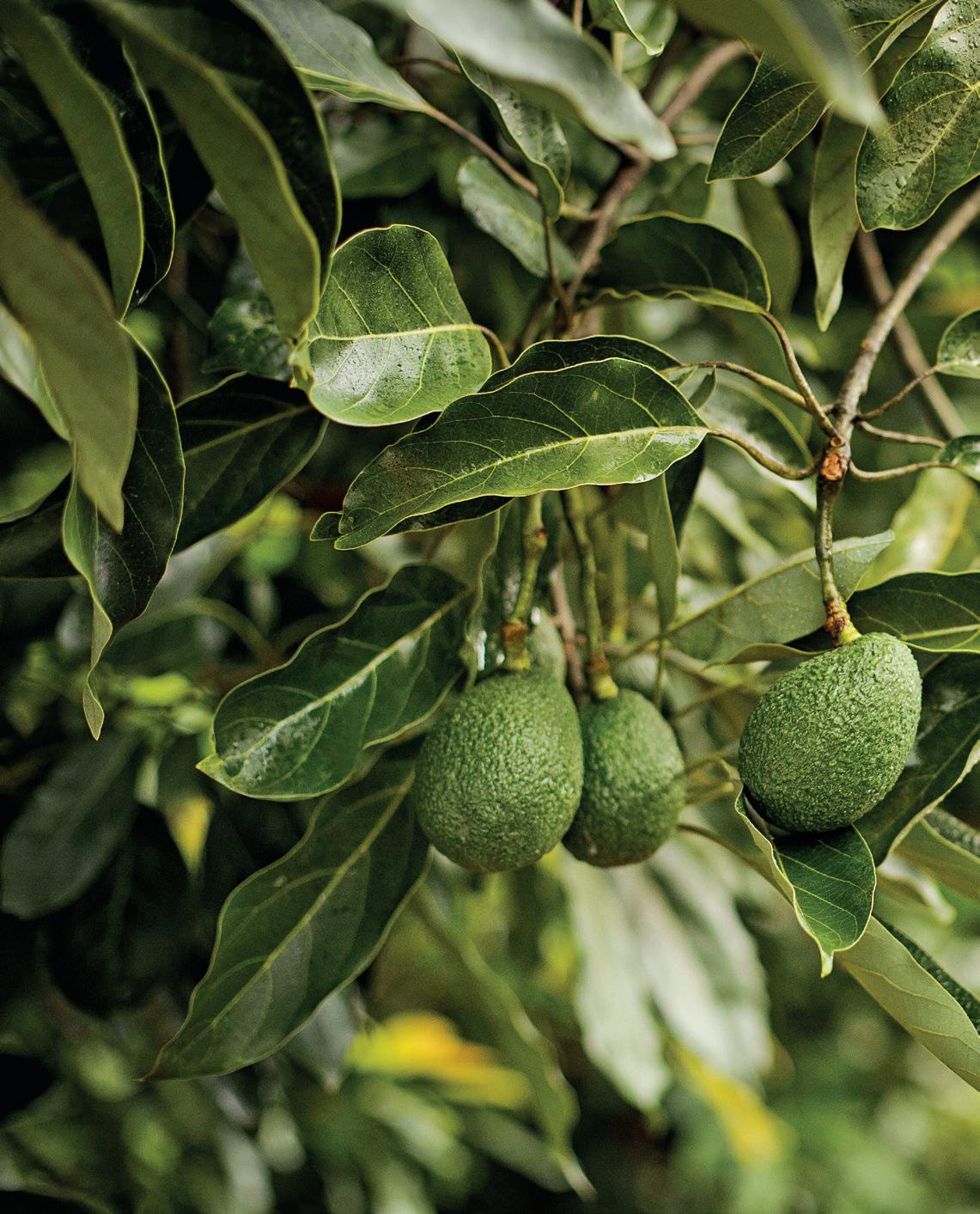

in the peak months. It won’t take much for that to happen.”
Destoop, who has more than 30 years’ experience in food and drink sector across multiple businesses including Carrefour, Danone and PepsiCo, was brought in last October to steer the company towards a more consumer-centred business strategy. “Understanding the end consumer better is what is going to drive growth,” he says. “We need to work more closely with our retail customers in developing a promotional strategy that’s not just focused on price, but on developing consumer occasions, by providing them

with the right marketing tools for their shoppers.”
Elsewhere, coming off a year in which it made solid gains in India and China – two of the fastest growing avocado markets in the world – Westfalia is looking ahead to continued market expansion across Asia in the latter half of the decade.
Westfalia entered the Indian market in 2022, investing in local production, nurseries and quickly securing its position as the market leader. The Indian market has grown tenfold in the last few years with consumption increasing from 200 tonnes to 4,000 tonnes. Last year the company harvested the first commercial crop of Indian grown Hass avocados and more than 200ha in Southern India will come into production shortly.
Thanks to its extended global footprint, the company is able to source for the Indian market from two production areas at any one time, including Tanzania, Kenya, Peru, Chile, and Australia, enabling consistent year-round availability for Indian consumers.
In December last year, Westfalia Fruit India imported the first commercial shipment of avocados from Australia after they were granted access to the market. With availability from November to March, avocados from Western Australia fit well into the Indian avocado import calendar, complementing African import programmes from April to November.


“We’re excited about Indian access for Australian avocados and are very close to securing Indian market access for our South African produced fruit. We believe that the demand for both Hass avocados and our exclusive and premium Gem variety will continue to grow on the back of strong per capita income growth and a rise in discretionary spending to 36 per cent in 2020,” says Bard.
“Over the last year we have seen a younger demographic embrace avocados into their diet with a focus on the more densely populated cities. With our investment in local farms, ripening rooms and logistics, we anticipate the next few years to be pivotal in the developing Indian market as the appeal and use of avocados widens.”
In China, meanwhile, the avocado market saw a downturn during pandemic lockdowns but since 2023 things have looked more optimistic. In August 2023,
“We have a yearround supply of good quality avocados that are going to every corner of Europe”
South African avocados were granted access to the Chinese market. As the leading exporter of South African avocados, accounting for half of all exports, Westfalia believes this significant development will shape the future of agriculture in the country.
“It’s a triumph for the avocado industry in South Africa and it gives us the opportunity to now grow the market and the local production in South Africa, particularly in the early and late season production areas,” says Bard. “This is an opportunity for us, as an industry, to invest and develop avocado production in South Africa which will directly benefit rural communities, providing jobs, improving infrastructure and overall investment in communities.
As with India, Africa is very well geographically placed to supply China and as a globally integrated company we are approaching the opportunities there in a sustainable and responsible way.” E
MAIN PICTURE & OPPOSITE PAGE—With a production footprint spanning five continents, Westfalia is the world’s biggest supplier of fresh avocados THIS PAGE, TOP—Westfalia’s business development executive Zac Bard THIS PAGE, ABOVE—Europe president Wim Destoop
Cabilfrut and Green SuperFood establish strategic partnership that could eventually see them sell avocados around the world under a single brand.
by Mike Knowles @mikefruitnet
Two of South America’s major produce exporters have effectively joined forces to develop their sales of fresh avocados on the international market.
The strategic alliance brings together Chilean group Cabilfrut and Colombian company Green SuperFood, with the ultimate aim to become one of the world’s most recognised avocado suppliers in the global marketplace.
Juan Pablo Cerda, executive director of Cabilfrut, said the alliance would target long-term expansion by integrating the strengths of both companies, from production to logistics and commercial sales. Eventually, that expansion could see other producers join the project.
“Our bet is ambitious, but at the same time, totally realistic,” he commented. “Green SuperFood already owns and operates a highstandard packing facility, which provides additional reliability to the operation in Colombia. The idea is to promote it so that all of
“Our bet is ambitious, but totally realistic. We have begun to use our infrastructure in a complementary manner”

the avocados that both companies produce in Colombia will be processed there.”
If successful, the companies will look to source avocados from other places, and indeed add other products to their shared portfolio. Rodrigo Manzo, director of Green SuperFood, suggested this would happen in the medium term.
“In the immediate future, we have begun utilising physical and human infrastructure in a complementary manner,” he explained. “This reduces costs and improves operational agility, resulting in an optimal fruit offering, not only in quality but also in volume and service. This, in turn, will allow our producers to obtain a be er return.”
In time, the partners said they planned to develop a joint brand identity and develop commercial marketing programmes under that label in the US, Europe, Asia and Latin America.
Santiago-based Cabilfrut’s business focuses mainly on production, marketing and export of Hass avocados as well as some other products like citrus. In recent years, its operations have expanded to Peru and Colombia, where it works with local growers and has also acquired its own farms.
Green SuperFood, meanwhile, is a major player in Hass avocados in Colombia, where its facilities focus on the production and export of premium, sustainable fresh fruit. E
ABOVE—Cabilfrut and Green SuperFood want to establish their alliance as a major player in avocados
At Fruit Logistica in Berlin, Chris Flowers, managing director of Kenyan avocado company Kakuzi, promised no let-up in the company’s efforts to ensure robust and sound Environmental, Social and Governance standards.
by Tom Joyce @tomfruitnet


“It is not just about growing an avocado, a macadamia, a blueberry or any other fruit for export. It is how you grow it”
Kenyan avocado producer-exporter Kakuzi has announced continuing plans to bolster and enhance the firm’s Environmental, Social and Governance (ESG) standards, while calling for sustained national compliance and branding to maintain global competitiveness.
Speaking at the Fruit Logistica exhibition in Berlin, Kakuzi MD Chris Flowers said ESG compliance continued to be a point of concern among international fresh produce buyers. Failure to adhere to ESG standards, he said, would be counterproductive to ongoing efforts to enhance the value of Kenya’s agricultural exports.
According to Flowers, sustained national compliance to ESG standards would necessitate joint engagements, as well as capacity-building among local stakeholders, especially those concentrated on exportled agribusiness ventures.
In order to maintain national competitiveness, he said, upholding ESG standards should be prioritised to make sure all agribusiness firms adhered to global sustainable benchmarks monitored by international buyers.
“For this reason, even as we advance our farm-totable quality standards, we are reiterating Kakuzi’s commitment to continue maintaining robust and sound ESG standards,” said Flowers, “including capacity-building for our smallholder farmer partners to enable us to secure the social licence to trade and operate.
“Commitment to ESG standards has slowly evolved from a voluntary practice to a national and international concern. It is not just about growing an avocado, a macadamia, a blueberry or any other fruit for export. It is how you grow it, and ESG is not a nice thing to have; it is a stakeholder concern that must be firmly embraced as a national branding pillar in the sense that Kenya is a country which understands our responsibility to the causes of climate action, water stewardship and being able to demonstrate that we do the right things as part and parcel of our daily lives.” E
Dan Mathieson says the group is reaping the rewards of efforts to lift quality and reduce costs, as well as strong consumer demand.
by Carl Collen @carlfruitnet
Zespri has released its final forecast for the 2023/24 season, with record per-tray returns forecast for green, organic green, SunGold and RubyRed kiwifruit.
The February forecast has green at a record NZ$9.44 per tray, “significantly up” from last season’s final orchard gate return (OGR) of NZ$5.78 per tray. Forecast SunGold kiwifruit returns are also at a record level of NZ$12.62 per tray, well above last season’s final OGR of NZ$9.97, while organic SunGold Kiwifruit is at NZ$14.21, the group outlined.
BELOW—Forecast SunGold kiwifruit returns are at a record level
BOTTOM—Around 193m trays are expected to be shipped in 2024/25

For Zespri RubyRed kiwifruit, the forecast average per tray return is at a record NZ$26.54, up from last season’s final OGR of NZ$22.27.
CEO Dan Mathieson said the “significant effort” undertaken by the industry to li fruit quality and reduce quality costs had been a key factor in the improved returns, along with strong consumer demand.
“The li we’ve seen in all of our per-tray returns is a real credit to the hard work that’s taken place across the industry and throughout our global supply chain to improve quality,” he explained. “It’s really helped our markets to maintain strong run rates and maximise value while closing out the season, with all categories other than organic SunGold kiwifruit expected to deliver record per-tray returns.
“While we’re always looking to increase the value we’re returning across all of our varieties, it’s particularly pleasing to see a real li in our green returns,” Mathieson continued. “That’s been driven by the increased value our teams have secured from lower volumes, especially in Europe, as well as strong market performance in Japan and North America.
“We’ve also seen strong demand for SunGold kiwifruit and RubyRed kiwifruit has continued

to perform strongly, which we expect to see continue as RubyRed becomes the first of this year’s crop to hit stores soon,” he noted.
With a crop of around 193m trays expected to be shipped in 2024/25, Mathieson said the forecast was an indicator of the sort of value that could be achieved by providing consistently high-quality fruit.
“We know that when we get good fruit to market it sells and
sells well, so continuing to focus on providing our customers and consumers with great kiwifruit throughout the season will again be our focus,” he said.
“As well as the focus on per tray returns, we’re also looking forward to seeing improved per hectare returns for growers in the coming season, with our February crop estimate showing a strong improvement in expected yields,” Mathieson added. E
As part of the Fruitbox series, George Lobisser of Ripe Locker talks to Chris White about post-harvest technology solutions and how they can make a difference to global fresh produce marketers.
George, can you explain what Ripe Locker is and what it is designed to do?
George Lobisser: Ripe Locker is a pallet-sized chamber that’s designed to move through the logistics chain and get as close to the retail consumer as possible. It’s connected to a control system that dynamically controls oxygen, CO2 and pressure 24/7.
Anyone can tell you your perishable is bad, but we can warn you before it goes bad.
What is different about Ripe Locker, that makes it stand out from what is already out there on the market?
GL: A good way to answer is to address how Ripe Locker is different from traditional controlled atmosphere storage. Atmosphere is a mix of gases that surround the earth, the air we breathe, and atmospheric pressure is 1,000 millibars. So it’s composed of 79 per cent nitrogen, 21 per cent oxygen and negligible CO2. Controlled atmosphere arranges the composition differently. Instead of 79-21, controlled atmosphere might generate 95 per cent nitrogen and 5 per cent oxygen via pumping nitrogen or CO2 in to displace oxygen. What’s different about Ripe Locker is that it’s a low-pressure
vacuum – we actually pump air out. So instead of having 1,000 millibars of air inside, we might only have 50 millibars. Assuming the traditional 79-21 ratio, the end result in a Ripe Locker if it only has 50 millibars of total air is that we might only have 40 millibars of nitrogen and 10 millibars of oxygen. We too can arrange the composition differently depending on how we operate the vacuum.
Does a vacuum mean that you are at risk of damaging the product?
GL: No, based on how low the pressure goes. The benefits of low pressure, which have been proven many times academically, over controlled atmosphere are numerous. Firstly we can slow respiration more than controlled atmosphere, yet avoid going anaerobic. Secondly, under vacuum, good gas – oxygen – gets into the centre of the perishable, and bad gases generated by the perishable, CO2 and ethylene, are flushed out of the centre quickly before damage occurs.
Also, in a vacuum transpiration or weight loss are reduced as the air inside the Ripe Locker is a fully saturated vapour. There’s no space for the water molecules to leave the
ABOVE—George Lobisser, CEO and cofounder of Ripe Locker

fruit, hence there is no weight loss.
It should also be noted that pathogens don’t reside in a vacuum, they only reside in free water. Lastly, the ultra-low oxygen and/or higher CO2 suppresses decay and kills insects, larvae and eggs.
What fresh products are you working with, and in addition to North America where are you operating?
GL: We are currently working with customers in cut flowers, blueberries, raspberries, blackberries, avocados, cherries, kiwifruit, lettuce, table grapes, asparagus and walnuts, and we’re even doing trials on fresh salmon.
Even before arriving in Berlin for Fruit Logistica in February, we had scheduled meetings with interested grower-packers from Europe, Chile, Peru, Ecuador, Colombia, Mexico, Australia, New Zealand, South Africa and North Africa.
https://bit.ly/Fruitbox103
Listen to the full Fruitbox interview with Ripe Locker co-founder and chief executive George Lobisser. Podcast

KIWIFRUIT
Low European stocks augur well for the start of the Chilean kiwifruit campaign but Southern Hemisphere supply is up overall.
by Maura Maxwell @maurafruitnet

Chile is anticipating a kiwifruit export crop of 130,000 tonnes this year, representing an increase of around 3.5 per cent on 2023.
Speaking to Eurofruit as growers geared up for the start of the 2024 kiwifruit season, Carlos Cruzat, president of the Chilean Kiwifruit Commi ee, said a low number of cold hours this season has caused a drop in the fertility of the plants, but quality looked good.
“The fruit has grown well, it has an intense green colour, but the season is running a li le late.” he said. “At this stage, careful irrigation will help improve dry ma er but the start of the season will depend on when the fruit is ready and whether it has accumulated a high enough Brix level.”
From this season, growers will

be supported by an app providing up-to-the-minute information on fruit growth and evolution. “That way producers can know what is happening at each orchard and what is being harvested in each region and at national level,” Cruzat says.
Regarding the market outlook, he
says lower European stocks indicate that early demand will be high. “This year Europe has a significantly smaller amount of fruit available. Greece and Italy both saw a 30 per cent decrease in production while Portugal, Spain and France also have smaller volumes. The result is that European stock levels are almost 50 per cent lower than last year,” he says.
Offse ing that, the recovery in New Zealand’s production this year will li the availability of Southern Hemisphere fruit. “New Zealand will produce around 115,000-130,000 tonnes more than last season, which is equivalent to Chile’s entire output. So no ma er how clear the markets are, there will be a large volume of fruit hi ing the market when we start our season, which must be taken into account,” Cruzat says.
In terms of promotions, the commi ee is planning marketing campaigns in India and the US. “We’ll also be carrying out in-store tastings and social media activities in Brazil and Mexico,” Cruzat says. “Brazil is an important market and has grown significantly in recent years so it’s important that we continue to focus on growing consumption there.”
In the medium term, varietal replacement is one of the biggest challenges facing the sector. Cruzat acknowledges that in the past, the country has had difficulties in developing new varieties.
“At a global level, the trend is that yellow kiwifruit is going to grow significantly. Today, about 50 per cent of exports are yellow fruit, and the remainder green, but in a few years yellow fruit will account for 75 per cent of the total,” he says.
“Therefore, Chile has the challenge of planting more yellow varieties. In the last 20 years we’ve had poor results because of Psa and Verticillium – of some 1,650ha planted, there remain just over 200 productive hectares.”
To counter this, the industry has set up a varietal working group to support the arrival and establishment of new varieties. E
TOP—Marketing campaigns will focus on India and the US ABOVE LEFT—Carlos Cruzat of the Chilean Kiwifruit Commi ee
Discover intelligent pre-grading technology for machine-harvested blueberries for the fresh market with TOMRA Neon.
The TOMRA Neon removes over 95% of clusters and over 90% of green and red berries, enhancing your optical grader efficiency. Reduce your labor requirements while still delivering the highest quality fresh product to your customers. It’s durable, easy to clean, and compact, making it a perfect fit for any existing blueberry processing line.
Enhance your blueberry operations by talking to a TOMRA Neon expert today. Get started at tomra.com/neon

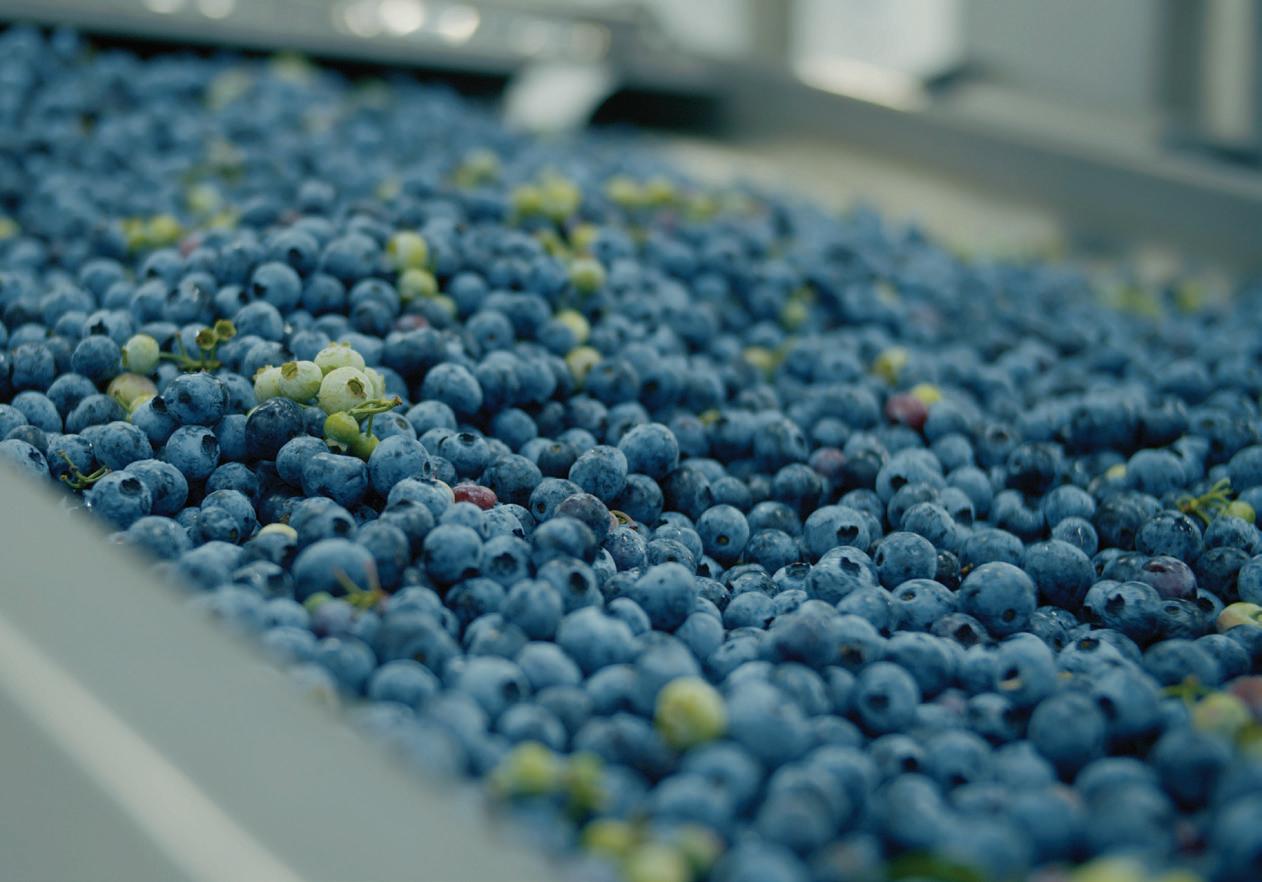


Talk to a TOMRA Neon expert today
Operating expenses are on the rise, and every efficiency and cost-cutting advancement has a significant impact. Let the TOMRA Neon enhance your blueberry operations, by making sure Every Resource CountsTM Get started at tomra.com/neon

The new LUCAi platform for InVision2 leverages Tomra’s Deep Learning technology to add value to cherry packing.
by Maura Maxwell @maurafruitnet
Tomra has added LUCAi Deep Learning technology to its InVision2 grading platform to help cherry packers process increasingly large volumes while maintaining high quality standards. The technology, which has already been applied successfully to blueberries and apples, uses pre-trained models to teach computers how to process data, such as complex patterns in photos, to achieve unprecedented grading precision.
According to Benedetta Ricci Iamino, global category director – cherries at Tomra Food, this represents a substantial leap forward in grading accuracy,
along with enhanced pack-out returns, less food waste and higher productivity. “The LUCAi platform, in fact, allows Tomra customers to process cherries at a higher speed (15 per cent more kg per hour, per lane) while optimising defect sorting,” she says.
“It helps them to achieve higher returns per kg packed than any other technology available today, reducing their food waste and enhancing their reputation for consistent quality in the markets. Another advantage is its new interface, which is very user-friendly, making it easy and quick for operators to adapt to the technology.”
LEFT & OPPOSITE
TOP—The technology uses pre-trained models to teach computers how to process data, such as complex patterns in photos, to achieve unprecedented grading precision
OPPOSITE
BOTTOM—
The platform uses Tomra’s Deep Learning technology to identify edge cracks, pacman cherries (half cherries), open sutures, cosmetic blemishes and stem pulls. It also improves detection of spurs, cracks and all defects around the stem area “with unparalleled accuracy”.
It uses pre-trained models built on a wealth of data and knowledge collected in multiple regions across the world for the past five years. “It is important to understand that AI technology is an empty box you need to fill; without a large amount of quality data, it goes nowhere,” Ricci explains.
“That’s where LUCAi stands out from any other AI platform available in the industry: it comes with vast amounts of data that Tomra has collected, building pre-trained models using real images of cherries that our customers pack, continuously developing LUCAi’s ‘brain’, which becomes smarter and smarter in the process and consequently more powerful and precise over time. This means that it is ready ‘out of the box’, able to deliver its superior sorting and grading performance as soon as it is installed at our customers’ operation.”
Tomra’s service team can help packers build tailored models that address issues with the varieties and defects specific to their operation, so that the platform performs to meet their precise needs and quality requirements.
According to Ricci, a key phase in Tomra Food’s product development process is testing in the field, in real conditions with customers. “That’s exactly what


we have done when extending our LUCAi Deep Learning technology to cherries: we tested and validated it in California and New Zealand during the past two seasons, collecting more data and working with our customers to help them build models to address their specific issues,” she says.
California’s Prima Frutta Packing has been using the technology in its cherry packing operation with excellent results, Tomra says. It has enabled the company to increase production and packing efficiencies (kg per hour per person) with the same workforce, allowing it to keep up with the short cherry harvest window while maintaining the high quality of its product.
Tomra points out that this is especially valuable in a challenging season like last year’s when the
cherries were about three weeks late and came to maturity all at once. The company successfully trained the system to accurately detect defects such as powdery mildew defects, insect bites and freshwater cracks after rain, which it would have found very difficult with its traditional mapping system. The user-friendly operation was another big advantage they highlighted.
Tim Sambado, president of Prima Frutta Packing, comments: “It’s really exciting to see how the system is going to evolve. I think we’ve just scratched the surface. I think there’s a lot more ahead of us”.
The LUCAi for InVision2 grading platform will be available on the market in the Southern Hemisphere for the 2024 cherry season, with other regions to follow. E
Tomra Food has restructured its business to become more responsive to its customers around the world. Until now Tomra Food’s operations have been split between two core business areas: fresh and processed. Now the company is merging these two divisions and switching to a regional model focused on sales and service.
The restructured business will operate in three main regions: the Americas (headquartered in Sacramento, California, and headed by Ryan Buzzell), APAC (from Melbourne, headed by Paul Slupecki), and EMEA (from Leuven in Belgium, headed by Karel Strubbe - pictured below left).
In addition, the company is integrating all its R&D units –as well as its supply chain, product development, operations and production – into one central hub called Global Solutions. This will be predominantly based in Dublin and Leuven, with some functions in other locations.
Tomra Food said the move would boost its operational efficiency and capacity for innovating and bringing effective solutions to market. “The reason for these changes is that our business is very global, and we have a lot of dependencies across different time zones,” explained Harald Henriksen, head of Tomra Food (pictured below right). “We want to work directly with the customer in as few time zones as possible, so we can be agile, responsive and develop local partnerships. It’s about the speed and quality in communications.”
He added that the Global Solutions R&D hub would be headed up by a single person, Ken Moynihan, making it easier to focus resources on priority product developments.
Going forward, there will be a focus on developing sorting machines to identify new quality issues and defects caused by climate change. And given the investment challenges faced by many customers, Tomra Food is exploring options for companies to lease equipment on a temporary basis.
Tomra Food is a division of Tomra Group. Founded in 1972, the Norwegian company specialises in sorting technologies for the food, recycling and mining sectors, as well as machines for the automated collection of used beverage containers.

Cutting machine and avocado processing robot were among the new solutions displayed by the German group at Fruit Logistica.
by Carl Collen @carlfruitnet
Kronen presented several new machinery solutions for the fresh produce business at Fruit Logistica in Berlin.
The German group’s new Tona V cu ing machine celebrated its world premiere at the trade show, a processing solution that cuts fruit and vegetables into wedges, slices and sticks. It said that the Tona V complemented the company’s existing portfolio of cu ing solutions, processing products with a maximum diameter of 120mm and a maximum length of 150mm.
The machine’s different cu ing inserts can be changed quickly, Kronen outlined, and the machine is easy to clean, thus enabling efficient processing even when frequently alternating between different products.
Tona V can be used to prepare products such as tomato segments, potato wedges, onion rings, courge e or mushroom slices, carrot sticks and pepper chunks, with a process a capacity of up to 3,600 pieces per hour, it said.
“The robot that processed avocados in a live demonstration was a particularly eyecatching highlight”
BELOW—The Kronen stand at Fruit Logistica showcased a number of the group’s solutions
per hour processed by three robots.
“We are delighted to have received such a positive response from the international industry and to have sparked such interest in both our innovative, new solutions and our well-established products,” said managing director Stephan Zillgith.
“The robot that processed avocados in a live demonstration at our booth was a particularly eyecatching highlight,” he noted. “A er all, the use of robotics is still somewhat of a rarity in the fresh-cut sector. Against this background, our robotic line, which is the only one of its kind in the world, was a must-see for many visitors.”
The Kronen stand also showcased a new product in the world of tabletop devices, the MMC 150 manual melon chunk cu er, which enables users to cut fresh melon into bite-size chunks. The tabletop device can cut melons up to 150mm in diameter and up to 200mm long into slices and chunks in a single operation. E
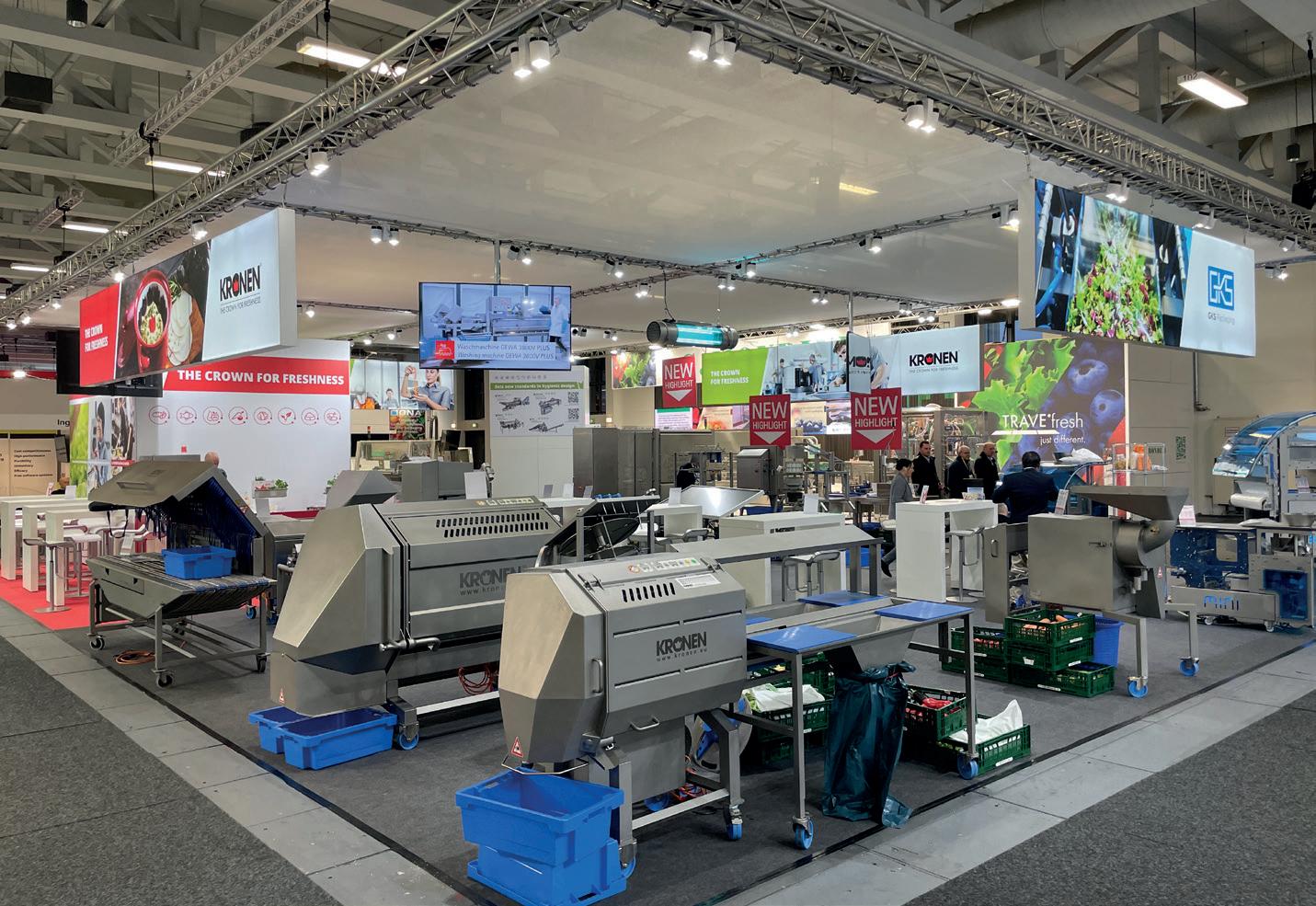
Visitors also saw the company’s Robot Avocado Line, a system that can halve, pit and peel avocados automatically. The line removes the avocado with a grabber specially adapted to the fruit and uses a rotating movement on a pi ing unit to remove the stone from the first half.
Knives cut the avocado flesh in half and clamp the stone, before the robot removes the peel from the flesh by moving it over the peeling knife. Kronen pointed out that this automatic processing offers a number of advantages, namely high reliability, hygiene, flexibility and planning in production, with up to 1,000 avocados













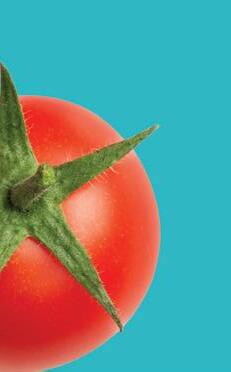


























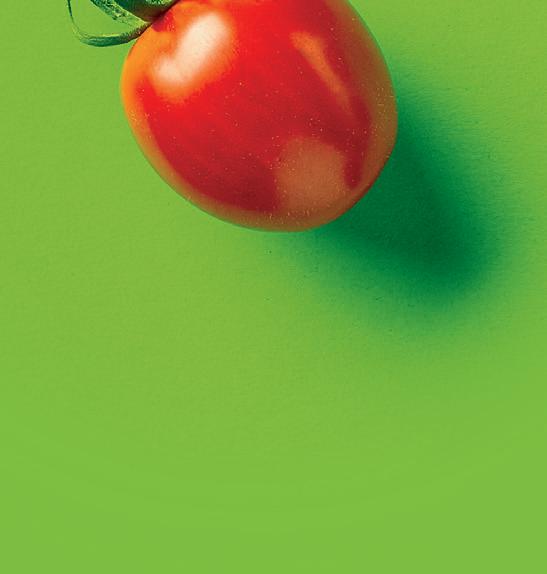

In an age of worker shortages, automated solutions like Sorma’s box-filling robot are not only helping to make up the shortfall, but are also improving overall efficiency.
by Carl Collen @carlfruitnet
Machinery specialist Sorma used Fruit Logistica to showcase its new box-filling robot for postharvest fresh produce processing. Designed to facilitate the placing of produce in boxes in an accurate, delicate and efficient way, the robot can place up to 30-40 packs of produce each minute.
Particularly unique is the automated hand that delicately places each pack in position,
“The robot was created because in Europe we have problems with workers. We want to help our customers.”
compared with an ordinary box filler which drops the packs of produce into a designated container a er travelling along a conveyor.
The box filling robot can substitute for one or two production line operators, which is crucial in today’s market given the ongoing problem of labour shortages. This was highlighted by Francesco Semprini, Sorma area manager, who spoke with Eurofruit at the trade show in Berlin.

“The robot was created because in Europe we have a lot of problems with workers,” he confirmed. ”So we want to help our customers with a solution that works continuously. When Covid restrictions ended, a lot of customers saw that workers were not available, so machinery like the box-filling robot is a great solution.”
According to Semprini, the new machinery is compact, offers a delicate method of placing and sorting the products – in this case potatoes – and utilises a 3D camera to organise products accurately.
“I think this machine is very good news for customers, because in two to three years it has paid back what it costs – it can carry out the work of one or two workers, without the inefficiencies associated with those workers,” he said.
The labour situation had heightened interest in the technology at Fruit Logistica, Semprini noted, particularly in the case of the box-filling robot.
“Customers are happy to see this, and they would like to have this machinery,” he confirmed. “In the past, the first thing they ask about is price. Now, they don’t ask about the price, they ask about availability, because the main problem is not cost but a lack of people working in production.” E
Paper-based packaging specialist Smurfit Kappa presented a European first at Fruit Logistica in Berlin (pictured below), namely the release of its AgroLife treatment for agricultural packaging. AgroLife is designed to increase the shelf-life of fruit and vegetables through the absorption of ethylene, which delays the ripening process in fresh produce.
Produced by Smurfit Kappa Totana, based in Murcia, Spain, the treatment is applied to paper-based agricultural packaging, be that corrugated boxes, lids, punnets or trays.
According to Smurfit Kappa, AgroLife is 100 per cent food contact friendly and does not affect the recyclability of the packaging.















Posted by Tom Joyce
The European Union may have thought the UK’s influence in Europe would have waned by now, but political developments across the continent give off an unmistakable whiff previously detected in Britain, and before that in the US. How the Bannonisation of global politics – named after the so-called brains behind Donald Trump’s rise and Nigel Farage’s bloated influence during the Brexit referendum – is likely to affect the fruit and vegetables business in Europe is hard to underestimate, such is the movement’s scope. But one thing’s for sure: the EU’s Green Deal is under threat.
Widespread protests across the EU, partly the result of farmers’ concerns over their livelihoods not being taken sufficiently seriously, this year caused the Commission to buckle on a host of climate-related targets. What the Commission is really afraid of is the creeping influence of the far-right across Europe.
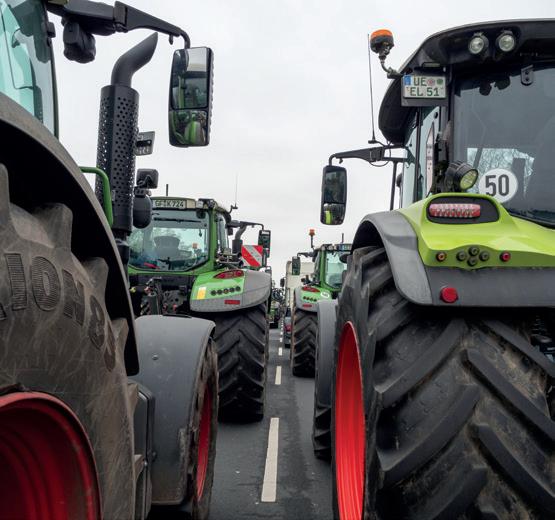
Farmers in the UK, usually the last place to see protests on domestic issues, have begun their own. Martin Fox, one of the founders of UK campaign group Proud to Farm, told the BBC that the government had “lost the trust of the farming sector”, adding that farmers sensed “the NFU isn’t listening to their concerns”.
Prime minister Rishi Sunak announced at the National Farmers Union conference that the UK would launch a new annual Food Security Index to monitor the nation’s self-sufficiency in food production, but critics say this is too little too late. The morning of the conference, news had emerged that the government had buried its own analysis of the dire financial prospects for upland farmers in post-Brexit Britain. But the word Brexit didn’t get so much as a mention from Sunak. He did, however, take an opportunity to mock the Common Agricultural Policy. “Just remember,” he said, repeating a line he had used on the eve of the referendum, “we used to argue about whether a cauliflower and a cabbage were the same crop.”
That same whiff again. Recently seen with former PM Liz Truss, Steve Bannon has a term for this sort of nebulous disinformation: “Flooding the zone with shit”. Unfortunately, that pungent influence appears to be making its way across Europe. E





Lidl’s growth in Denmark since it entered the country in 2002 has been steady and unspectacular, but that might be about to change. It has a brand new headquarters in Aarhus, and earlier this year it opened its 150th Danish store. Now it seems the group is on the charge, with a plan to open 60 new stores in the coming years, to bring its total up to around 200. And despite that fact that price discounting remains hardwired into its commercial strategy, the fresh produce offer in new outlets like this one around 75km west of Copenhagen reflects the importance of quality to its obvious health and sustainability commitments. E




































FPJ






















































































































































Personalised

